FRESH WAYS TO COOK WITH EGGS

FEEDS HER SOUL & FINDS ANSWERS IN HER FAITH


HOST OF “ THE TALK ”
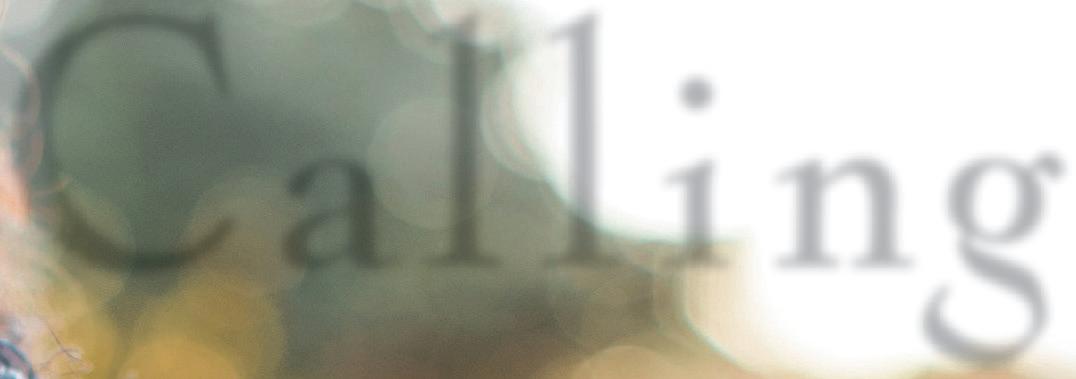


GBAJABIAMILA







When You Have No Idea, God Does
COUNTRY MUSIC’S AARON TIPPIN
Salutes America’s Heroes

SUMMER 2023 FREE
AKBAR
Tamera Mowry Housley ® MAGAZINE -





See something you like in the magazine? Most titles featured in this publication are available at our retail partners: Save when you buy in bulk at churchsource.com/jc 800-727-3480 store.faithgateway.com 800-834-7828
Splash into Summer Adventures with Jesus Calling Books!

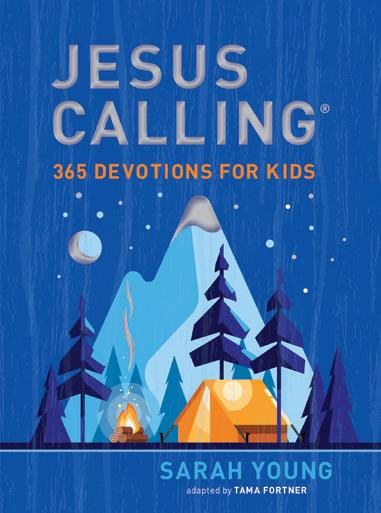
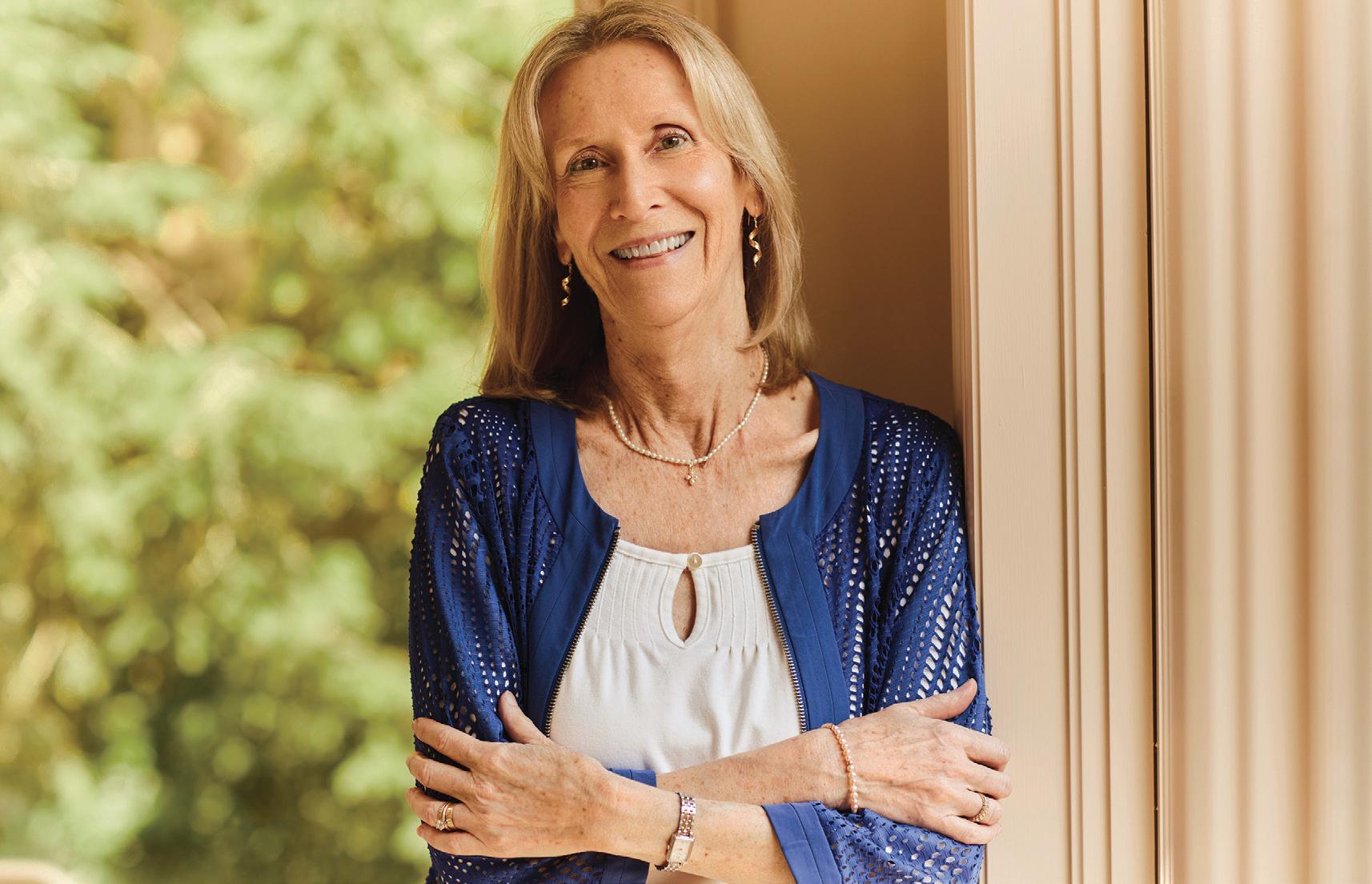
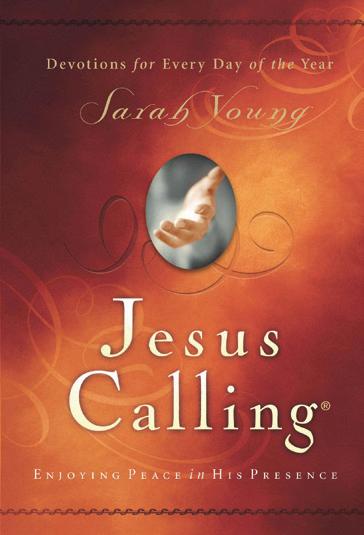
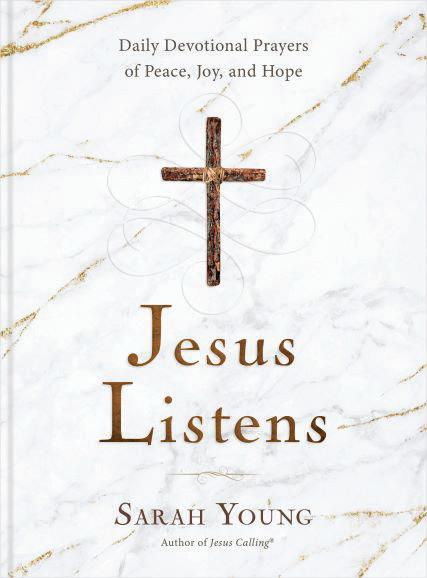
Dear Reader,








This has been a stormy year. The weather in 2023 has been very dramatic in many areas of the United States.








I have experienced various kinds of storms in my life. Occasionally they have been literal, physical storms. While we were living in Japan, our family experienced two typhoons. The first was in Tokyo, the day we were moving to the city of Suzuka with our six-week-old baby. It was the worst typhoon to hit Tokyo in twenty-five years, and it made our moving day extremely difficult and dangerous. The second typhoon came less than two years later—at Takayama, where we were vacationing for a week in a cabin overlooking the ocean. Thankfully, we evacuated our cabin shortly before the typhoon hit land. After the storm had passed, we returned to the cabin and found our daughter’s crib filled with broken glass. I’m so grateful for God’s protective Presence in these perilous situations!
Most of the storms in our lives are metaphorical—challenging circumstances that unnerve us. And sometimes we waste a lot of energy worrying about stormy situations that might happen but never actually come to pass. I’ve found that the best antidote to worrying is trusting the Lord. One of my favorite Bible verses is: Trust in Him at all times . . . pour out your hearts to Him, for God is our refuge (Psalm 62:8 NIV). To develop deeper trust in Jesus, we need to come to Him and pour out our hearts about the things that are troubling us. He is indeed our Refuge in the midst of all our storms!
Jesus Always Note-Taking Edition
Jesus Listens
Jesus Calling for Kids
Jesus Calling
PHOTO BY JEREMY COWART


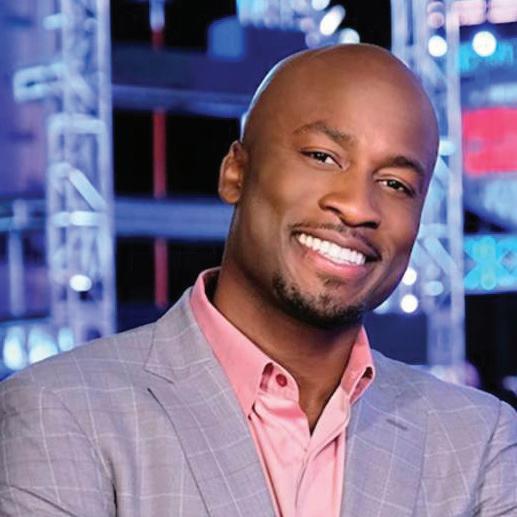


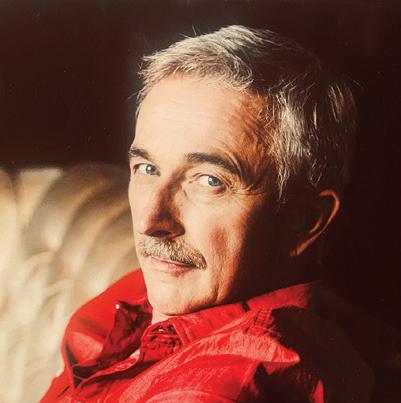


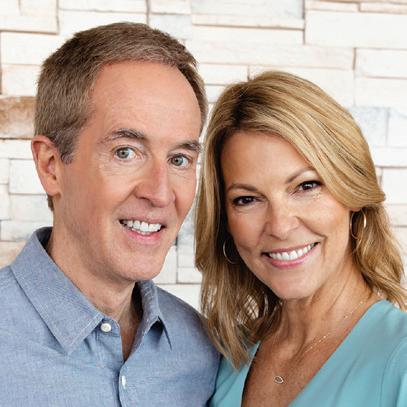



CONTENTS SUMMER 2023 THE ® MAGAZINE COVER STORY | 8 Tamera Mowry-Housley Finds God’s Love in the Small Things Akbar Gbajabiamila | 3 Laura Minchew SVP & Group Publisher Michael Aulisio VP & Publisher Editor-in-Chief Robin Richardson Senior Marketing Director Mandy Wilson Marketing Director Stephanie Chalk Senior Marketing Manager Laura Neutzling Managing Editor Abigail Nibblett Production Manager Amy Kerr Copyeditor Barbara Moser Creative Director Peter Ackerman Senior Operations Manager Michelle Lenger Designer Published quarterly by Thomas Nelson, Inc. P.O. Box 141000 Nashville, TN 37214 Printed in the U.S.A. © 2004 Sarah Young All rights reserved; no materials may be reproduced in any form without the express written permission of the publisher. The Jesus Calling Magazine is not responsible for problems with vendors or their products or services. Cover photo by Ashley Burns Photography For advertising inquiries, visit JesusCalling.com/magazine Aaron Tippin | 32 Andy & Sandra Stanley | 30 3 American Ninja Warrior’s Akbar Gbajabiamila: Stepping Out in Faith Creates New Opportunities 6 Doing Good: The Story of a Piano Prodigy and a Gift That Changed Everything 12 Ryan George: The Life of a Faithful Adventurer 14 Folds of Honor’s Luke Sherman & Rachel Faulkner Brown Help Heroes’ Families 16 A Jesus Listens Prayer 17 Pastor’s Corner: David Kim on Cultivating Community 18 A Mother and Daughter’s Online Affirmations Inspire Millions 20 Recipe: Lisa Steele’s Fresh Eggs Daily 22 US National Soccer Player Walker Zimmerman: Why Connection Matters 25 Crystal Paine: Time-Management Toward a Better Life 28 Stories of Jesus Calling Around the World 30 Andy & Sandra Stanley: Parenting Kids in Every Stage of Life 32 Aaron Tippin: Standing Up For What You Believe 34 Jesus Listens: Stories of Prayer: Charlene Tilton Walks into the Light 35 Music Spotlight: Naomi Raine of Maverick City Music Empowers People to Worship 36 Proverbs 31 Ministries Lynn Cowell and Michelle Nietert on Managing Your Emotions 38 Comedian Nazareth Takes Laughter Where It’s Needed Most 40 Summertime Games & Puzzles
YOU START IT YOU FINISH IT




TV Host Akbar Gbajabiamila on the Unexpected Joys of Never Giving Up

 by Lauren Winfield
by Lauren Winfield
SOME OF THE LESSONS OUR PARENTS give us in childhood stick more than others, like ”show respect to other people,” and ”try to learn from your mistakes.” But for the host of the reality show American Ninja Warrior and CBS daytime talk show The Talk, Akbar Gbajabiamila, something his father instilled in him from childhood still acts as a North Star: no matter where you go, you're an ambassador for the family—and for God. “I’ve never, ever forgotten that,” he says.

3
OF
IMAGES COURTESY
AKBAR GBAJABIAMILA
It’s not a lesson that came naturally or easily. But he’s glad he learned it all the same.
Growing up in Los Angeles in the 1980s, Akbar dreamed of playing in the NBA as he watched Magic Johnson and Kareem AbdulJabbar power his favorite team, the Los Angeles Lakers, toward five championship trophies in twelve years. The young boy practiced constantly, dribbling a basketball to and from school everyday, but he had one problem: “I was clumsy,” he admits. “I was never the best player—and kids picked me last.”
Nevertheless, Akbar kept dribbling and practicing. Over the years, he became determined to make his school’s basketball team. “I have to. This has to happen,” he remembers saying to himself. With disbelief, his dogged practice paid off. “Making the Crenshaw High School basketball was like making the junior Lakers. And when I made the team, I was crying.”
High on joining the team, Akbar’s journey took an unexpected turn when something about him stuck out to the school’s football coach, who told Akbar, “You should play football.” And over the next few years, the coach kept after him, repeating, “You should play football. You should play football,” to the point that Akbar finally caved in. “I remember the first day of football practice, I had bruises and bumps and thought, This is barbaric. I don’t want to play this anymore. So I quit.”
It wasn’t long before Akbar found himself face to face with his father,

who received a call from the coach about his son’s decision. And he had another lesson for his son: “You start it, you finish it.” It didn’t hurt that he ended his missive with, “If you don’t play football, then you can’t play basketball.”

His father’s words reverberating in his head, Akbar returned to the football team so he could play both sports, and what came next surprised him. “My senior year in high school was my first year playing football, and I started to see success,” Akbar recounts, still surprised. He developed a knack for sacking quarterbacks, and Division I coaches noticed. He received five scholarship offers to play football—and zero for basketball.
He went on to play college football at San Diego State University on scholarship, where he became serious about his Christian faith, thanks to the mentorship of pastor Miles McPherson. After his NCAA tenure, Akbar was drafted into the NFL as a defensive end for the Oakland Raiders.
“What's the story here?” the former player pontificates. “Sometimes you have no idea— you have your mind set on something else, and sometimes
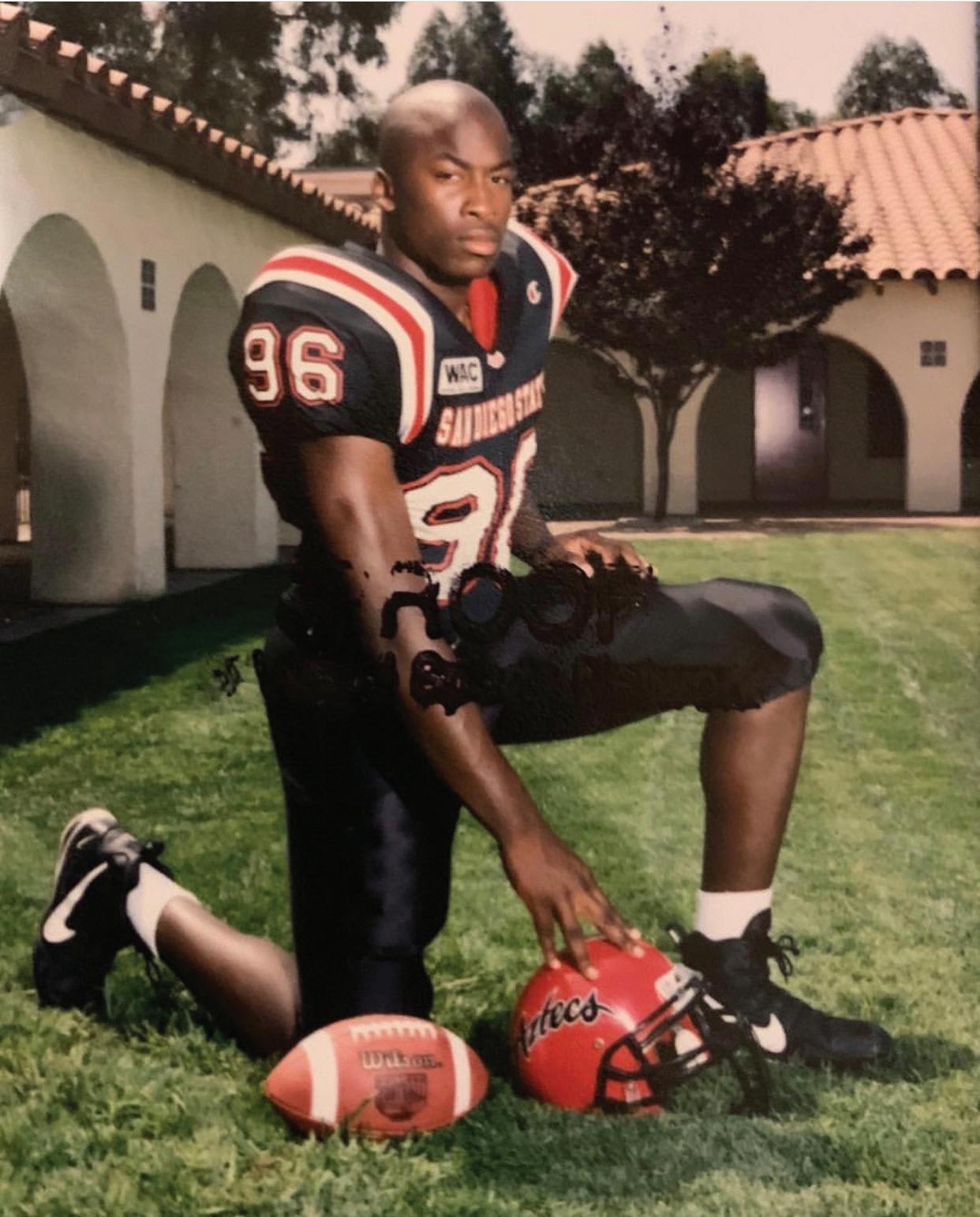
“
Sometimes others see something special in you that you can’t see in yourself.
Akbar playing for San Diego State Aztecs
others see something special in you that you can’t see in yourself.”
His NFL career lasted about five years, during which Akbar admits “I wasn’t an NFL star.” That was a problem for the young man, who was eyeing what he’d do next. A communications major in college, Akbar had his eye on becoming an NFL analyst, but those mics were usually reserved for big-name stars of the league. So he took a different approach.
“One day I’m sitting in my townhome in San Diego, and I thought, You know what? I’m going to go to the local NBC station, and I’m going to tell them I’d like to work for them. The former player showed up at the studio unannounced, telling the station manager he’d give post-game commentary for local sports teams—for free. The station manager jumped on it. “It took me about five years before I kind of broke onto the scene, and in between there, I almost gave up. But I remembered my father saying, ‘If you start it, you finish it.’”
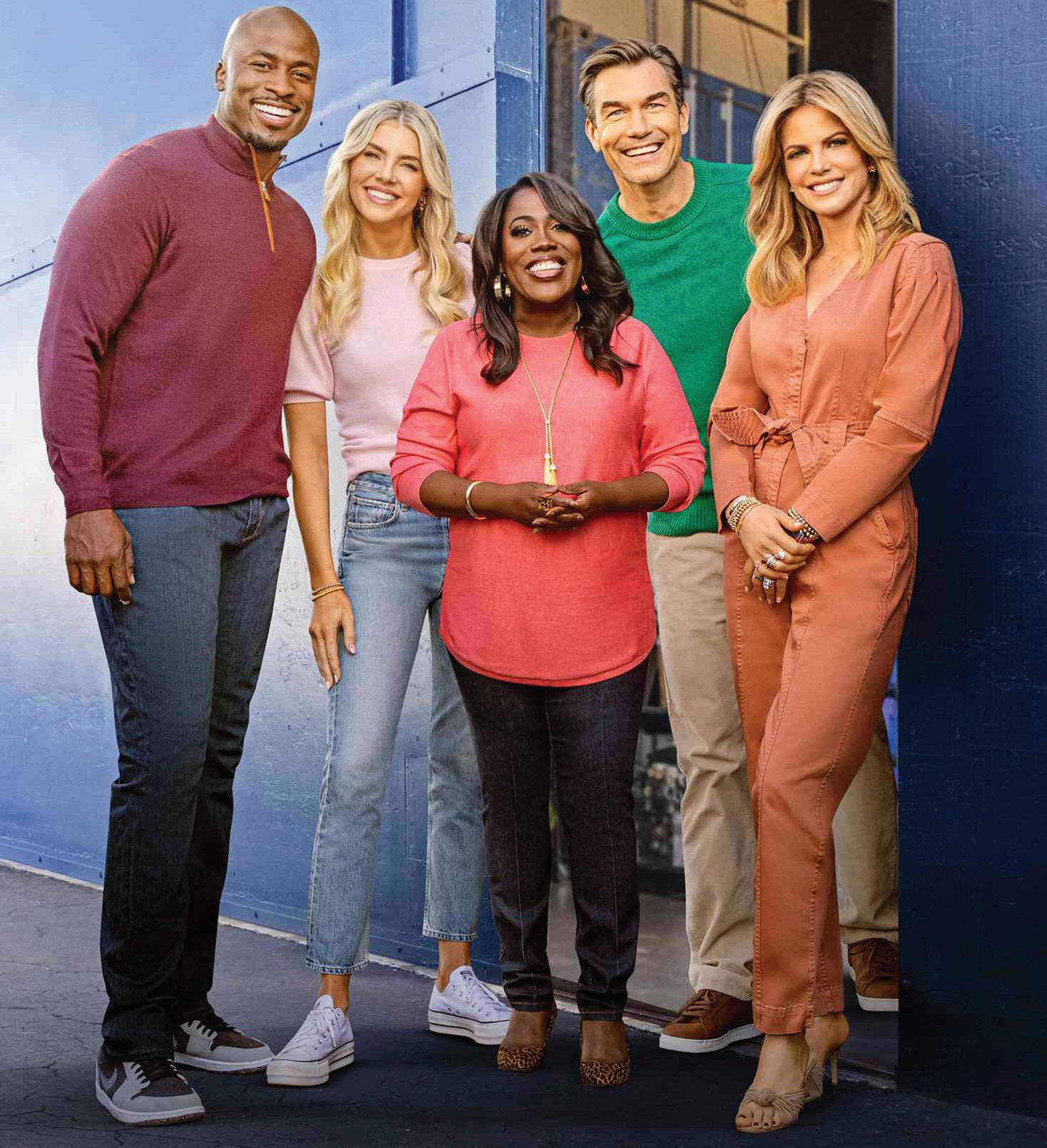
Clinging to that lesson, and with his NFL savings running dry, Akbar found himself with a shot at the job of his dreams: he earned an audition for the NFL Network. “As the Lord would have it, that day I got the job. And it changed everything.”

Today the broadcaster hosts shows like American Ninja Warrior and The Talk. He even has a third show, a new series called Fight to Survive on Roku.




“Sometimes you have to create your own opportunities,” Akbar declares. “Sometimes you have to step in faith, even if it looks scary.”
It’s a lesson the kid from South Los Angeles has seen time and again, another hard-won truth he can add to the collection of lessons he learned from his father.
Adapted for print from the Jesus Calling Podcast. Put your phone in Camera mode and hover over this code to hear more of Akbar’s story!


You can find Akbar’s book, Everyone Can Be a Ninja: Find Your Inner Warrior and Achieve Your Dreams, at your favorite book retailer today.
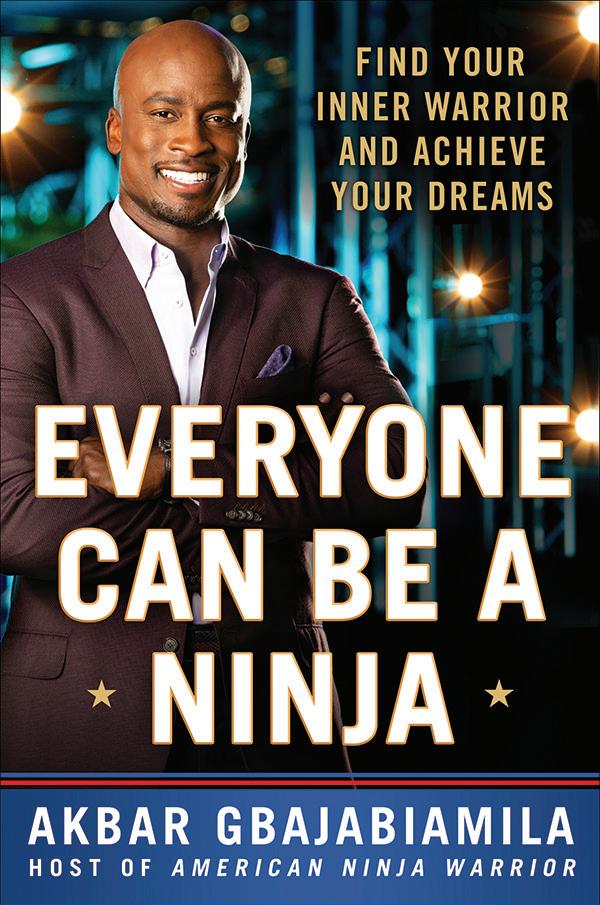
5
American Ninja Warrior with his father
Akbar with co-hosts of The Talk
INSPIRING EXTRAVAGANT GENEROSITY A Young
Man’s God-Given Gift Sets Off a Chain of Giving
by Laura Neutzling
WHEN YOU HEAR ELEVEN-YEAR-OLD Jude
Kofie play the piano, his style brings to mind the likes of musician Harry Connick, Jr., an effortless mastery of the keyboard tinged with a hint of jazz influence. But the truth about Jude’s ability speaks to a mysterious gift with no logical explanation. And that gift has taken wing to inspire others in huge ways.
Jude arrived early to the world via an emergency cesarean section. Jude’s father Isaiah, a musician who’d moved to Denver recently from Ghana with his family, remembers watching helplessly as doctors whisked his son to the neonatal ICU to tend to his low oxygen levels and the hole in his heart. In the coming days, Jude would face multiple
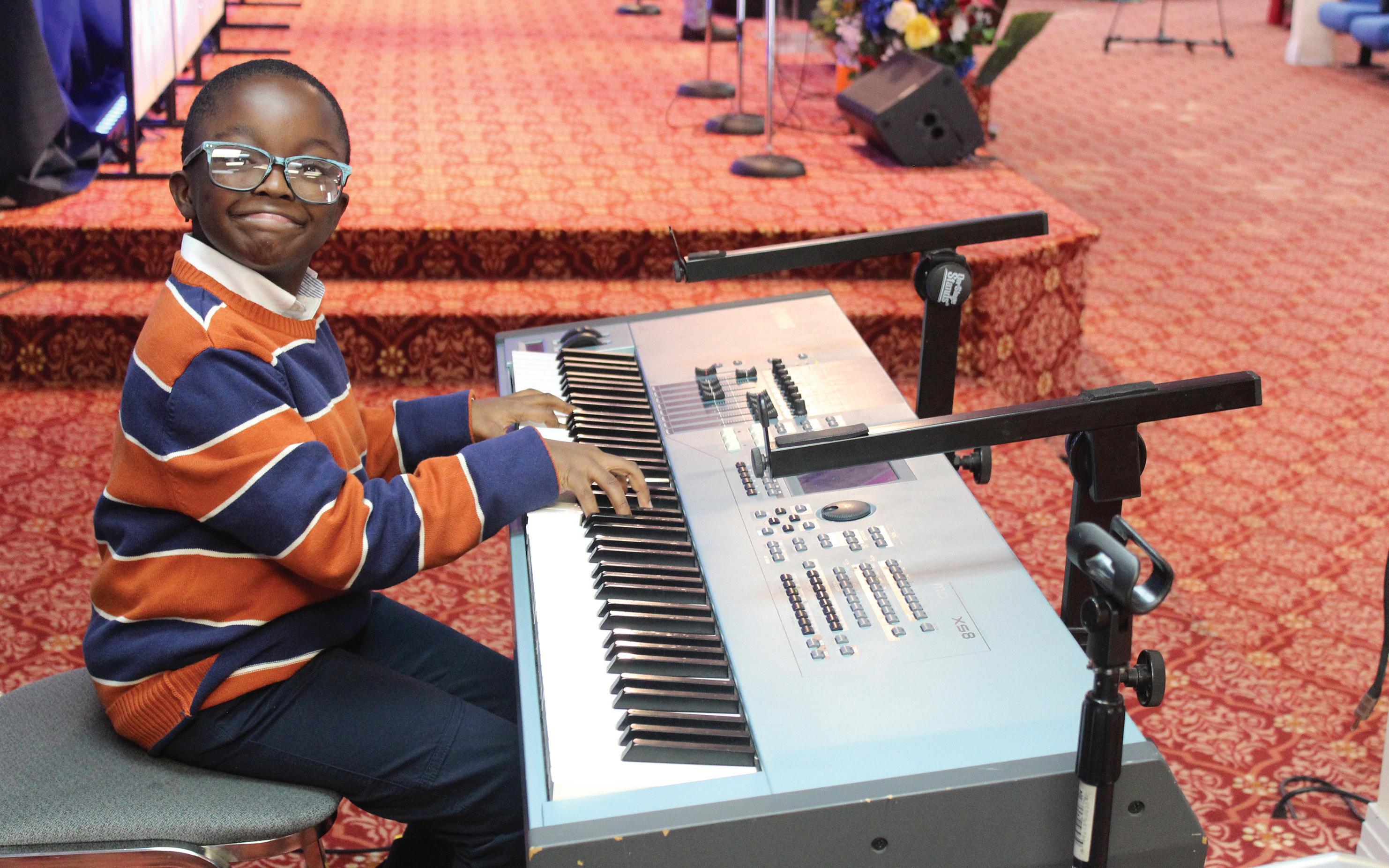
heart surgeries, the need for a feeding tube, and an eventual diagnosis of autism. Like any parent, Isaiah worried about what the future would hold for his son, who’d already faced so many challenges.
One day years later, Isaiah heard music floating up from the basement. He wandered downstairs surprised to find that the source of the beautiful melodies was then-ten-year-old Jude! Planted at a small, portable keyboard, his son, who struggled mightily with his school lessons, was playing the piano effortlessly. He’d taught himself to play at master levels by replicating what he had seen on YouTube videos.
As Jude wowed family and friends with this newfound ability, the story started to spread. Before they knew it, a local Denver TV station came to do an interview with the unlikely prodigy, capturing him playing on the little keyboard.
As the story spread further, one viewer took a particular interest. Bill Magnusson, a local piano tuner, was bowled over by Jude’s ability. “I could see how extraordinary his talent was,” says Bill. Noticing the small keyboard Jude was playing, the man began to wonder what would happen if this young talent had the opportunity to practice and perform on a real piano.
So Bill set a plan into motion. He’d just received a small inheritance from his father and knew that this money needed to go toward a piano for Jude. He began to research, tirelessly reviewing options at stores and with online sellers. Finally, a piano presented itself that checked all the boxes. Through the TV station, Bill reached out to Isaiah and Jude, asking them to join him to see the instrument. After checking all the things any good piano technician would and finding the workings to be satisfactory, Bill looked to the Kofies for approval.
“It seems awesome!” Jude declared enthusiastically.
It was a joyous day when the Kawai concert grand piano was delivered to the Kofie home.
“We are still blown away,” says Isaiah.
And Jude’s response? “Oh, so wonderful!”
Each month since the arrival of the piano, Bill makes the drive to the Kofie’s, carefully cleaning and tuning the piano to concert levels. With each trip, Bill began to receive a gift in return: a closer relationship
with the Kofie family, and a new status as a family member himself.
“In Ghana,” Isaiah notes, “everybody who is older than you qualifies to be your dad, your mom, uncle, or grandpa. That’s why I can confidently say that Bill is Jude’s grandfather.”

Bill humbly acknowledges that he was just a conduit for something bigger than himself, and that there are many more opportunities to come, like Jude’s recent appearance on The Kelly Clarkson Show “I realized that this is going to cause other people to perform acts of kindness that they would not otherwise have done. When you think of the ripple effects of that, it’s pretty cool. To me, I just bought a piano. All the rest of this stuff is God.”

7 DOING GOOD IMAGES COURTESY OF ISAIAH KOFIE
Adapted for print from the Jesus Calling Podcast. Put your phone in Camera mode and hover over this code to hear the Kofies’ inspiring story—and to hear Jude’s fantastic piano skills!
“
To me, I just bought a piano. All the rest of this stuff is God.
Jude and Bill Magnusson
Tamera Mowry-Housley’s BIG DREAM MOMENT
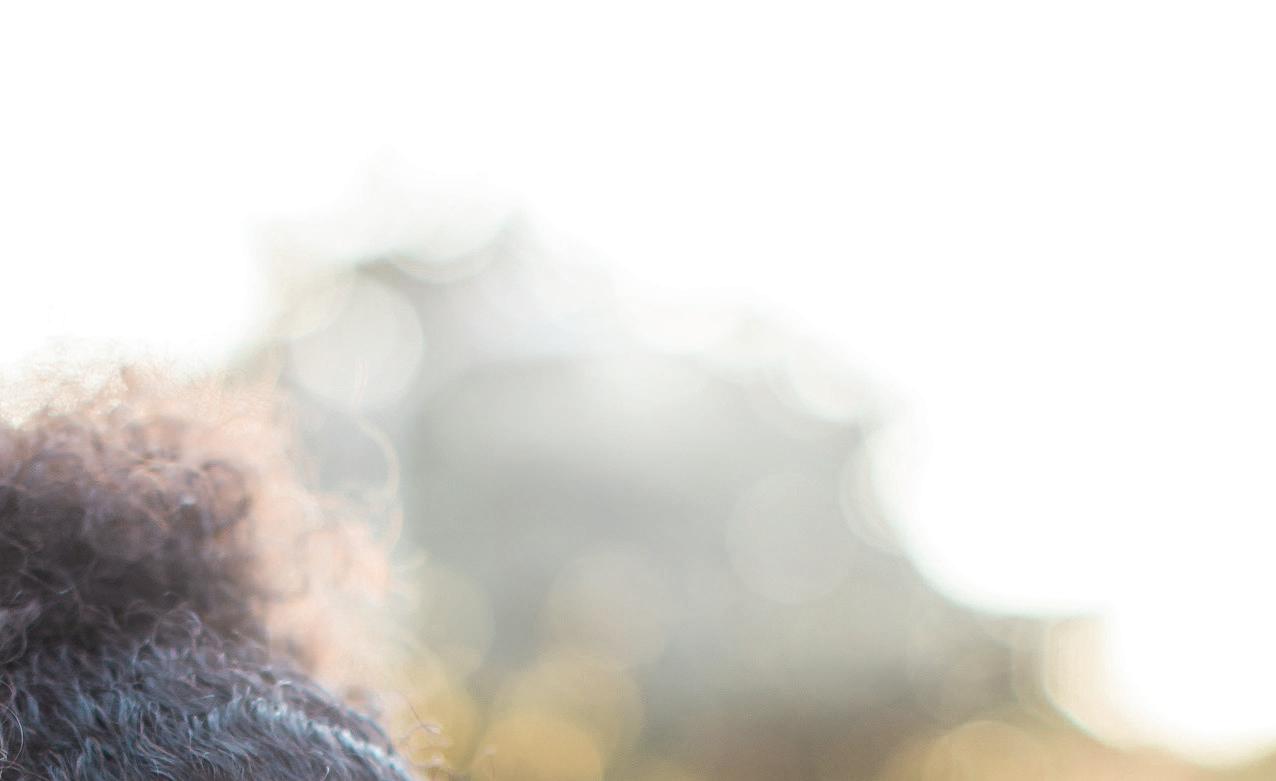



and Finding God's Love in the Sma Things







 by Laura Neutzling
by Laura Neutzling

MOST OF US KNOW Tamera Mowry-Housley as one half of the memorable twin-sister duo on the hit ABC show Sister, Sister—a ‘90s sitcom staple still watched by a large audience via streaming services like Hulu and Netflix. Tamera’s turn as the spunky twin of her real-life sister Tia captured the hearts of millions. But before the fame she found in her teen years, Tamera’s childhood seemed to follow the typical script of an “army brat,” as she likes to call it.

Born in Germany during the late ‘70s to parents in the US Army, Tamera describes her childhood as “amazing,” with her parents being loving and supportive in the ever-shifting atmosphere of a military family. Frequent moves to new locations were part of that shifting atmosphere, and Tamera has fond memories of the neighborhoods where the family lived in Hawaii and Texas. Their days were filled with school and extracurricular activities like dance and gymnastics. And though the Mowrys weren’t wealthy, they always made sure Tamera and Tia had what they needed, helping them adjust to any new location they were assigned.
After a typical school day, Tamera’s mom would be waiting to pick up the siblings, and they’d go home to catch up on TV soap operas before getting ready for dinner. Tamera found herself fascinated by the characters, especially their dramatic styles and looks. “I remember their hair was coiffed, and their makeup was done ‘just so.’ Even if they were hanging out at their house, they looked like that. And I thought, Wow, that looks like fun.”
Tamera often told her mother that she wanted to go into acting, just like the characters she saw onscreen, and her mom wasted no time in finding out how she could be supportive of Tamera’s dream. She began to look into what opportunities were out there for the girls, to see if acting might be something they would enjoy. Eventually, the twins were getting small parts in local Texas commercials and in community plays. “I absolutely loved it,” Tamera remembers. “I was nine years old, and I felt like I’d found my calling.”
Tamera’s mom could see how much the girls were taking to acting—especially Tamera, who labeled herself “the guinea pig” who was willing to try anything. She started to investigate ways that she could get Tamera and her sister even more involved in the acting world. An agent friend advised that the girls could continue to work locally, but if they wanted to make it on a bigger scale, they’d need to move to Los Angeles or New York.
Tamera’s mom began to pray about it. “She made a deal with God,” says Tamera. “She wanted to make sure that if acting was going to turn into something for us, that it would be worth quitting her job to become our manager. So, we went out to Los Angeles for one month. She decided if we booked a commercial or something else in that time, it was for us.”
Church was a regular part of the Mowrys’ weekly routine, and Tamera remembers the joy on her mom’s face when she would sing in the choir. She also remembers feeling very drawn to God in those days. “I learned about Jesus and God at an early age,” Tamera says. “I loved Sunday School. I wasn’t afraid to talk to Him.”
In just a few weeks, the girls were cast in a Chrysler commercial, which sealed the deal for Tamera’s mom, and the family made the permanent move to Los Angeles. The girls initially found themselves somewhat in demand, which was exhilarating at the beginning, but after a while began to create some insecurities in eleven-year-old Tamera. “You’re auditioning against so many others who have been doing this for years. I was bright-eyed and hopeful, but I started to learn that the business could











IMAGES COURTESY OF ASHLEY BURNS PHOTOGRAPHY,
TAMERA MOWRY-HOUSLEY; ISTOCK
COVER STORY
Tia, Tamera, brother Tahj
How Tamera Keeps Anxiety at Bay







BE AWARE AND LEARN FROM YOUR EXPERIENCES
When I was a kid, I remember my grandmother telling me, “You have a very wise soul.” I didn’t care how cool or popular I would look, if someone told me to “jump off a cliff,” I was the type of person who said, “I know what’s at the bottom of that hill, and I don’t want to go there.”It might seem good on paper, but if you feel like your gut tells you something is off, maybe it isn’t for you.
LEARN TO LET GO AND GIVE IT TO GOD
I’ve learned to give things to God, and He gives me peace. More importantly, He gives the warmth of His love. Because love heals—it’s a balm, no matter what you’re going through.




LEARN THE DIFFERENCE BETWEEN GOD’S VOICE AND “MY VOICE”

It’s human nature to want to stray. That’s why it’s important to have a relationship with Jesus. I can know the difference between “a coincidence” and an answered prayer about my deepest fears only God knows I prayed about. This happens when I read the Word, meditate, and pray daily.
be challenging and found myself questioning, Did I make the right decision? Am I good enough?”




As Tamera approached her teen years, she began to feel pushed and pulled in different directions with the demands of producers and directors—so much so that she began to experience stress, a loss of identity, and ultimately anxiety.
“I was fourteen when we got Sister, Sister, and that’s when I started to go through feelings of anxiety and fear. I was grateful to God for finally achieving my dream, but I used to struggle with a spirit of perfection. I thought if I was perfect, all the problems would go away.”
Tamera was with the show until she was twentyone and described how her need to be perfect evolved into a sort of prison. The pressure of staying “on top, being on a successful show, then realizing










10
“
I thought if I was perfect, all the problems would go away.
Tia and Tamera on Sister, Sister
your show is canceled,” found her asking, What becomes of your dreams after that?
He cares about even the smallest details of our lives.
When Tamera began to see she was losing her step, she made a point to return to reading the Bible and praying, which had brought her such comfort when she was younger. “I’ve realized that prayer and reading the Word wasn’t something I necessarily wanted to do, it was something I needed to do to protect my peace, my spirit, and my mind. Otherwise, I’d find myself holding onto insecurities and anxiety longer than I should.”
Now Tamera is a mom herself, and still acting— with a Daytime Emmy Award and an NAACP Image Award under her belt over the span of her twentyfive-year career. And her return to prayer and Bible reading is still a routine she tries to practice every day.

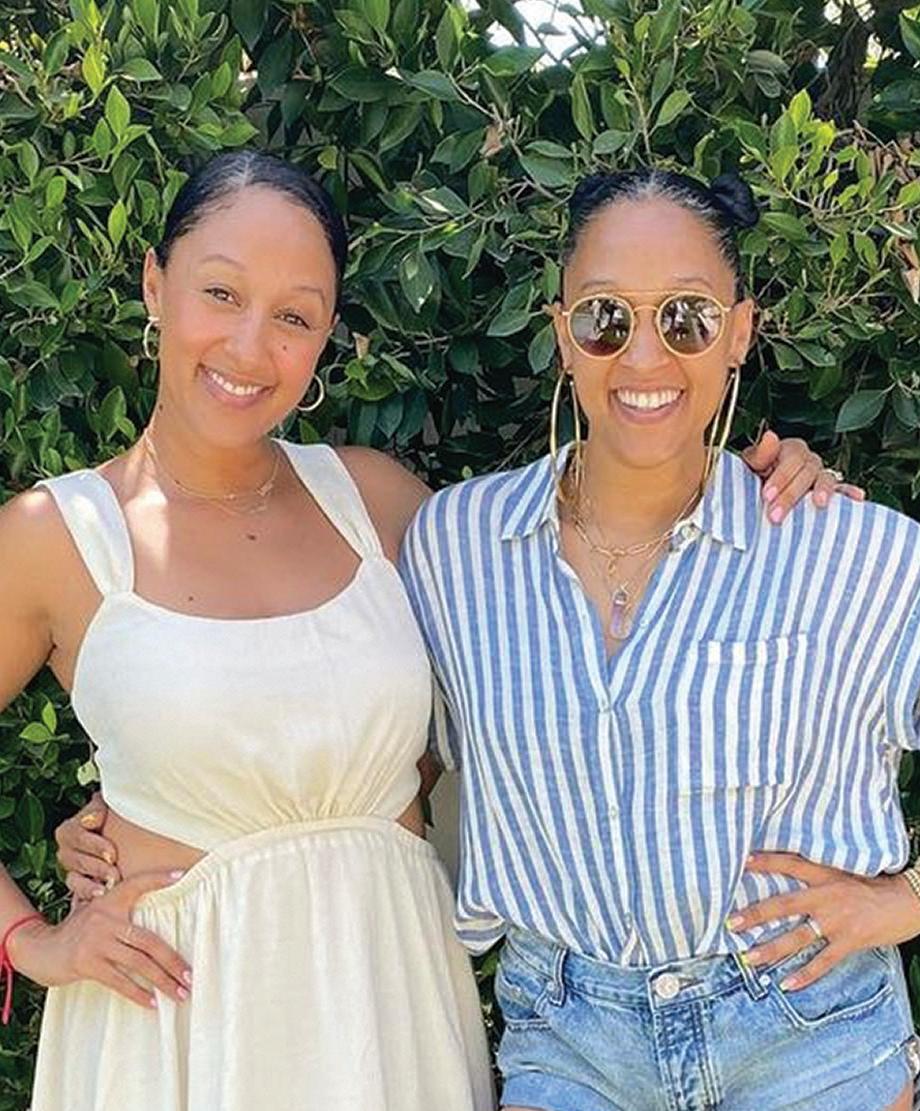
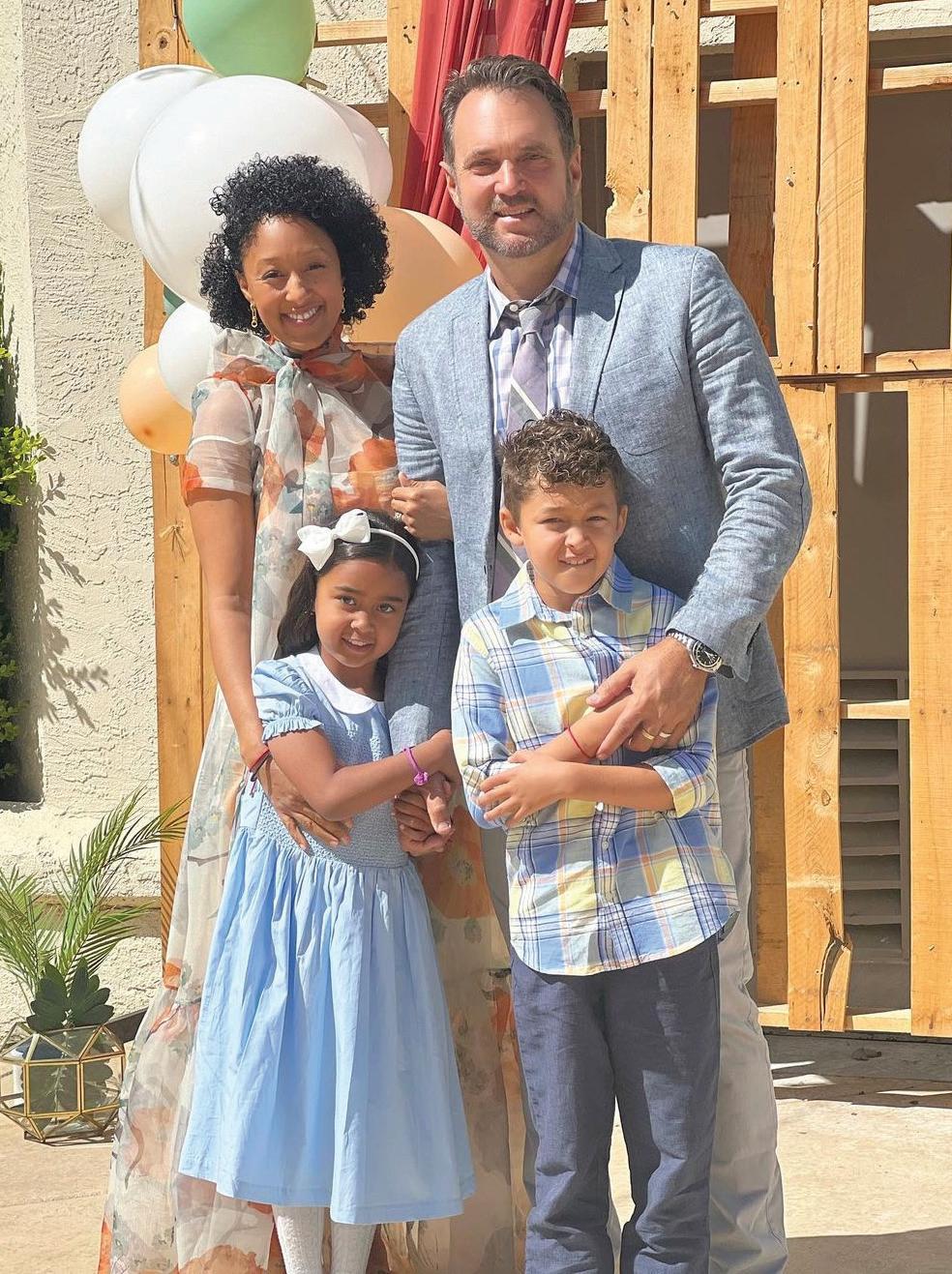
“The moment I give it to God, no matter what I’m going through—fear, heartbreak, grief—He





understands. Knowing that He loves us and cares for us always uplifts me. Whenever I feel like I’m struggling, lost, uncertain, I go to the Word of God. I have realized that He cares about even the smallest details of our lives.”
Adapted for print from the Jesus Calling Podcast. Put your phone in Camera mode and hover over this code to hear more of Tamera’s story!










You can find Tamera’s book, You Should Sit Down for This, at your favorite book retailer today!

11 COVER STORY
“
Tamera and her family
Tamera and Tia today
AN ADVENTURE IN FAITH



Facing Fear and Opening Up to a More Meaningful Life


 by Michael Overholt
by Michael Overholt
RYAN GEORGE IS AN ADRENALINE JUNKIE if there’s ever been one. He’s bungeed on five continents, paraglided in seven countries, and ice-climbed and snowcamped in Antarctica.


There’s no telling what’s next.
It would appear that Ryan is fearless, undaunted by any extreme. But one person’s challenge is another’s “walk in the park,” something the adventurer readily admits. Some might be more afraid of climbing a delicate frozen waterfall. Others, like Ryan, might be more afraid of opening up to relationships as delicate as that frozen waterfall.
What Ryan has also discovered is that these challenges are opportunities to grow in this adventure called life, especially when the desire to overcome those challenges is stirred by a divine prompting. “The bigger the prompting from the Holy Spirit, the harder the challenge—but greater the reward is afterward,” he declares.
Ryan’s upbringing was difficult, to put it mildly. His father was abusive. Ryan was homeschooled and had little interaction with other kids. His experience was so traumatizing that he made it a point to never become a father, even going so far as to medically take becoming a father off the table. He built a wall of protection between himself and his traumatic upbringing because he knew that fatherhood would have made him vulnerable to relive his dark, childhood memories.

After years of conquering one extreme after another, Ryan saw that he needed something beyond chasing the next adrenaline high to add more meaning to his life. He decided to take on a new challenge, one that could potentially knock down that wall of protection he had so carefully built: a choice to become more emotionally vulnerable.
“From a faith perspective, vulnerability is counter-instinctual, especially if you grow up in a religion that focuses on saying the right things, doing the right things, wearing the right clothes, listening to the right music, all that kind of stuff—the externals,” Ryan explains. “Being vulnerable breaks down that whole system. And so thankfully, that system was smashed in my life.”
While he was paddleboarding in the glacial waters of British Columbia, he got a text from his wife Crystal saying, “Oh, by the way, a young lady was put in our protective care. She was in one of my small group Bible studies. The police sent her home with us. She's living with us now.”
You can imagine how off-putting this may have been for a man who’d set strict boundaries around fatherhood. But with his new challenge in mind, Ryan did what he never thought possible: he became a father. For the next three years, Ryan and Crystal fostered that young lady, Deonnie, before they legally became her adoptive parents.

Fatherhood has been an adventure more fear-inducing for Ryan than skydiving and more challenging than balancing himself on the wings of an old biplane performing loops and barrel rolls. But he has also found that parenting has been the most rewarding experience of his life.

His therapist pointed out, “You realize every breakthrough that we’ve had in this room was through the filter of you being a dad, right?”
Adventures come in all forms, Ryan notes.
We have to learn how to embrace the ones we’ve been given, because every adventure holds the opportunity for personal growth. This reality has pushed out the walls of Ryan’s imagination so that he now seeks adventure in everyday life.
“We’re all called to live an extraordinary life. And so I look for adventure, not just on these massive trips that end up on social media, but in my daily life.”

13 IMAGES COURTESY OF RYAN GEORGE Adapted for print from the Jesus Calling Podcast. Put your phone in Camera mode and hover over this code to hear more of Ryan’s story! Ryan’s book Scared to Life is available at your favorite book retailer today!
THE POWER OF A ”YES” TO HELP MILITARY FAMILIES


Folds of Honor’s Luke Sherman & Rachel Faulkner Brown








 by Abigail Nibblett
by Abigail Nibblett
LUKE SHERMAN AND RACHEL FAULKNER
BROWN know firsthand what it means to sacrifice for their country. But they’ve taken it a step further to extend that helping hand to other families who are hurting and need hope.
A retired thirty-year veteran of the Tulsa Police Department, Luke felt the call to serve when he was in college. He would go on to become a SWAT leader who trained countless officers, helped people through their worst crises, and prioritized the tenets of protection and service. Though there were trials that tested him along the way, Luke says, “It was a blessing to do that job, because you realize that people needed you. As folks said to me many times, ‘Without you defending us, this would be a totally different place.’ It was really rewarding.”
Collectively, these experiences prepared Luke to take on a new role: as Senior Vice President of Outreach for the nonprofit Folds of Honor. The mission of the organization, created by fighter pilot and PGA professional Lt. Col. Dan Rooney, is to provide assistance to the children of America’s fallen or disabled military members and first responders.
Folds of Honor is there to “fill in the gaps” for these families by establishing relationships with them, offering scholarships for continuing education, and moving forward with them into their next chapter. “I’m a big fan of the honor of recognizing those who have fallen,” says Luke, “but I’m a bigger fan of that next day, and what we are doing to help.”
Part of his job is to visit grieving families, though it can be intimidating to find the right words to say
to someone in the wake of their greatest tragedy. But the veteran has discovered that serving in the most difficult circumstances comes with a silver lining. “Everybody has fear,” Luke explains. “But from every tragedy, there’s an opportunity. Sometimes you don't see the results of the work that you do, but if it’s done with the foundation of faith behind it, it’ll change lives. It’s God’s calling for me.”
Folds of Honor was created for families just like Rachel Faulkner Brown’s. The director of Be Still Ministries and Never Alone Widows, Rachel has known her fair share of heartache as a Gold Star Wife, a term that describes those who have lost a spouse while they served the Armed Forces. Though she comes from a long line of military service in her family, nothing could have ever prepared her to lose her husband Blair in the line of duty.
When she first laid eyes on him, Rachel was drawn to Blair because of his love for Jesus—and his flight suit, she adds with a laugh. After falling in love with each other and with squadron life, the pair got married, started their family, and moved to Mississippi, where Blair was set to train the next generation of fighter pilots in the T-38 airframe.
But on April 23rd, 2008—with a two-year-old son and five-month-old daughter at home—Blair took off in an airplane with a student pilot in the backseat. As they climbed over the runway, a cable in the wing broke, and the two were ejected. They were killed instantly.

Your yes is so powerful in the kingdom, and it changes lives.

Rachel was left widowed and heartbroken. But in her darkest hour, her dad—on a quest to help his daughter—found a ray of light through a simple Google search. He called to tell her about a new organization he’d found, called Folds of Honor, that could provide scholarships for Rachel and Blair’s two small children when the time came. “Almost from the moment Blair died, I have known there were people caring about my children,” Rachel says. “And here I sit, fifteen years later, with two kids who were highly educated in the best schools because of what Folds of Honor has done.”
That gift of education was priceless, which prompted Rachel to join the Folds of Honor speaker’s bureau, so she could share her story of faith and healing with other military families who might, unfortunately, need the same gifts from the nonprofit. “It’s truly miraculous what God does with a yes,” she says. “I think about Dan Rooney’s yes, and that Luke and I are sitting here today. Your yes is so powerful in the kingdom, and it changes lives.”
You can learn more about Folds of Honor at foldsofhonor.org.


Adapted for print from the Jesus Calling Podcast. Put your phone in Camera mode and hover over this code to hear more of Luke and Rachel’s story!

















IMAGES
OF
COURTESY
LUKE SHERMAN AND RACHEL FAULKNER BROWN; ISTOCK
“
FROM TOP: Luke speaking at Folds of Honor, Rachel and her family
An exclusive excerpt from Sarah Young’s 365-day prayer devotional Jesus Listens


March 16
Sovereign God, I need to give up the illusion of being in control of my life. When things are going smoothly, it’s easy for me to feel as if I’m the one in charge. Yet the longer I perceive myself as my own master, and the more comfortable I become in this role, the more at risk I am.




I can enjoy times of smooth sailing and be thankful for them. B ut I must not become addicted to a sense of mastery over my life—considering it the norm. I’ve learned from experience that storms will come and uncertainties will loom on the horizon. If I cling to control and feel entitled to having things go my way, I’m likely to sink when I encounter diffi culties.


Help me to trust in You at all times—pouring out my heart to You, for You are my Refuge . Thank You for using adversity to set me free from the illusion of being in control. When my circumstances and my future are full of uncertainties, I can turn to You and take refuge in You. I want to fi nd my security in knowing You , the Master who is sovereign over the storms of my life—over everything!
In Your great Name, Jesus, Amen
I MAGE :ISTOCK
JAMES 4:13–14 NIV • PSALM 62:8 NIV • JOHN 17:3 NKJV
EXCERPTED FROM JESUS LISTENS , COPYRIGHT 2021 BY SARAH YOUNG. USED BY PERMISSION OF THE PUBLISHER. ALL RIGHTS RESERVED.
Five Ways to Cultivate True Community
by David Kim
Discipleship & Formation Pastor West Gate Church Silicon Valley, California.
I was born in South Korea and came to the States when I was ten years old. I was pretty excited, but I quickly realized we can be around people and still feel alone.

I had a teacher named Ms. Stratuli. On my first day of school, she realized I had no idea what was happening—I couldn’t understand what she was saying. The second day, she handed out pieces of paper, and asked everyone to draw an item in the classroom. She asked me to write what each item was in Korean, and the other students to name each item in English. She pasted those pieces of paper around


the classroom and left them up for the whole year, so that I could identify what those items were in English. And in that moment, I felt seen, known, and cared for.
This is what we really want: for someone to come alongside and say, “I see you. You’re not alone, and we can do this together.” That really shaped my journey of belonging.
God made us in community, for community. And these five practices—priority, chemistry, vulnerability, empathy and accountability—can help us develop intentional and healthy relationships.
A friend loves at all times.

– Proverbs 17:17 NIV
So priority is the first practice in which we build community. We live in a culture where we can go an entire day without seeing anyone. Priority is a reminder to intentionally reach out and build friendships.
Next, we move onto chemistry, which is really important. Jesus had twelve disciples, but He leaned into the “inner three” disciples—Peter,
James, and John. We can care for our entire community and still forge relationships with a few that God is bringing to us for greater connection.
Then, we get into building our community through vulnerability, where we can open up and be honest about what we’re struggling with, and we’re met with deeper connection.
And as we become vulnerable, we get into empathy. And empathy says, “I see you, I feel you, and I’m going to celebrate with you and what you’re going through.” Finally there’s accountability. Because we are not just called to build a community where we can connect; we are to help each other become all that Jesus is inviting us to be.
These five practices can help us forge the communities we’ve been all longing for, where we are truly seen, known, and loved.
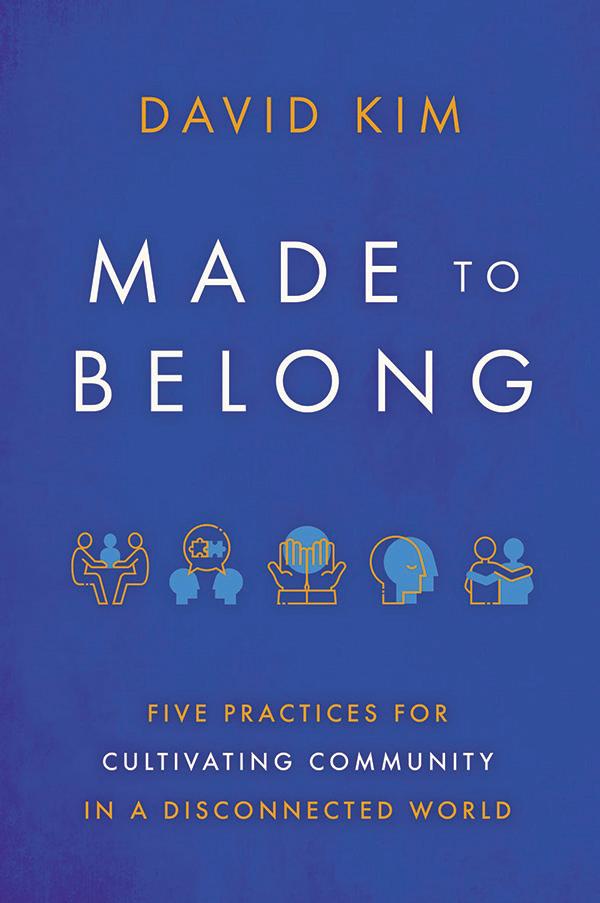
17
PASTOR’S CORNER IMAGES COURTESY OF DAVID KIM
You can find David’s book Made to Belong at your favorite book retailer.
Adapted for print from the Jesus Calling Podcast. Put your phone in Camera mode and hover over this code to hear more of David's story!
JESUS LOVES ME!




























































Speaking Kind Words to Ourselves and Others










































































































































































Social Media’s Affirmation Advocates, Tiania and Scarlett



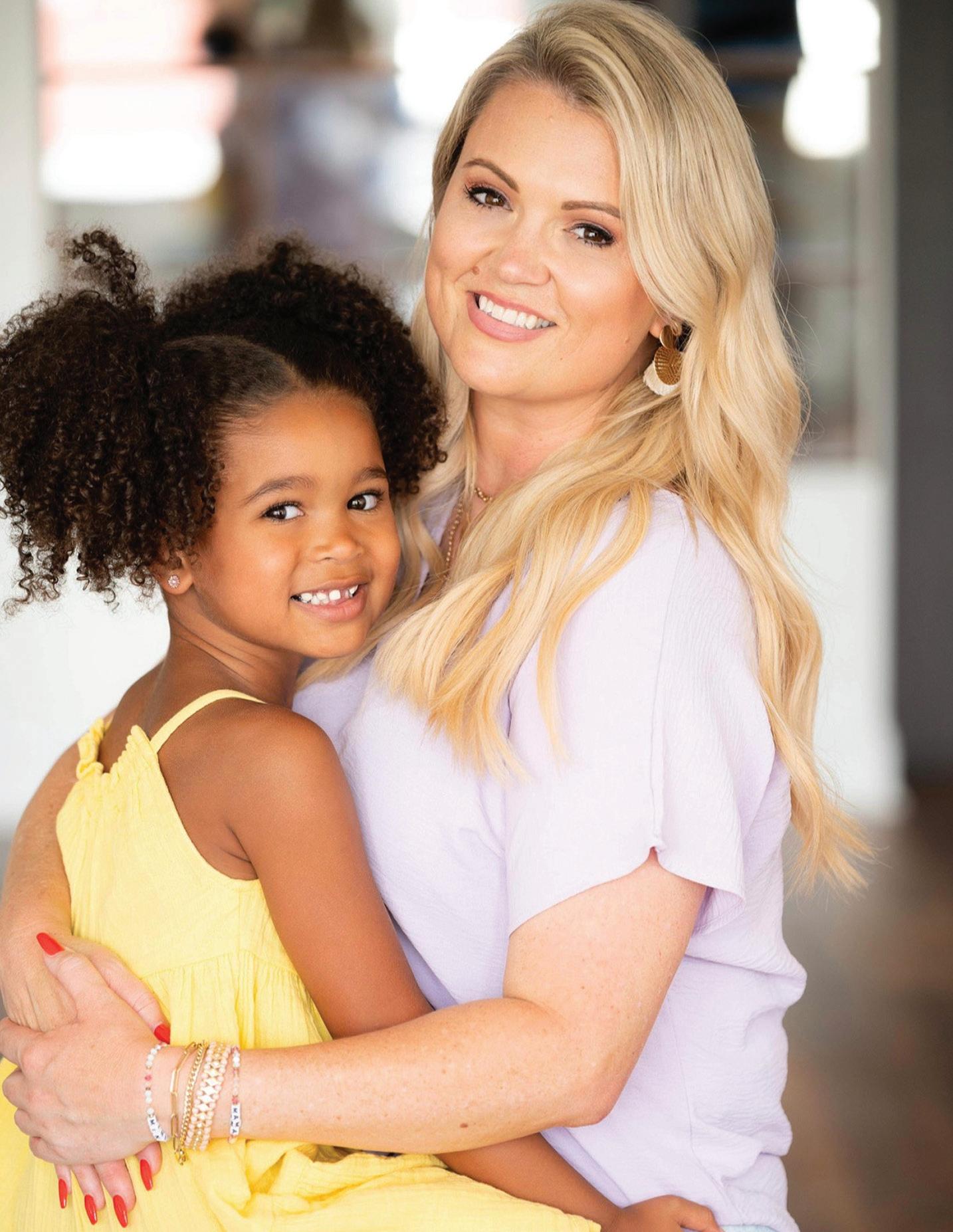
























 by Laura Neutzling
by Laura Neutzling
IN


























































A SOCIAL MEDIA LANDSCAPE





























































where “doom-scrolling” has become a disturbing norm, there are a few standouts that brighten our lives when they pop into our feeds. Influencer Tiania Haneline and her six-year-old daughter Scarlett are bringing an infectious energy to their TikTok page in an unexpected way: in a daily positive affirmation routine.


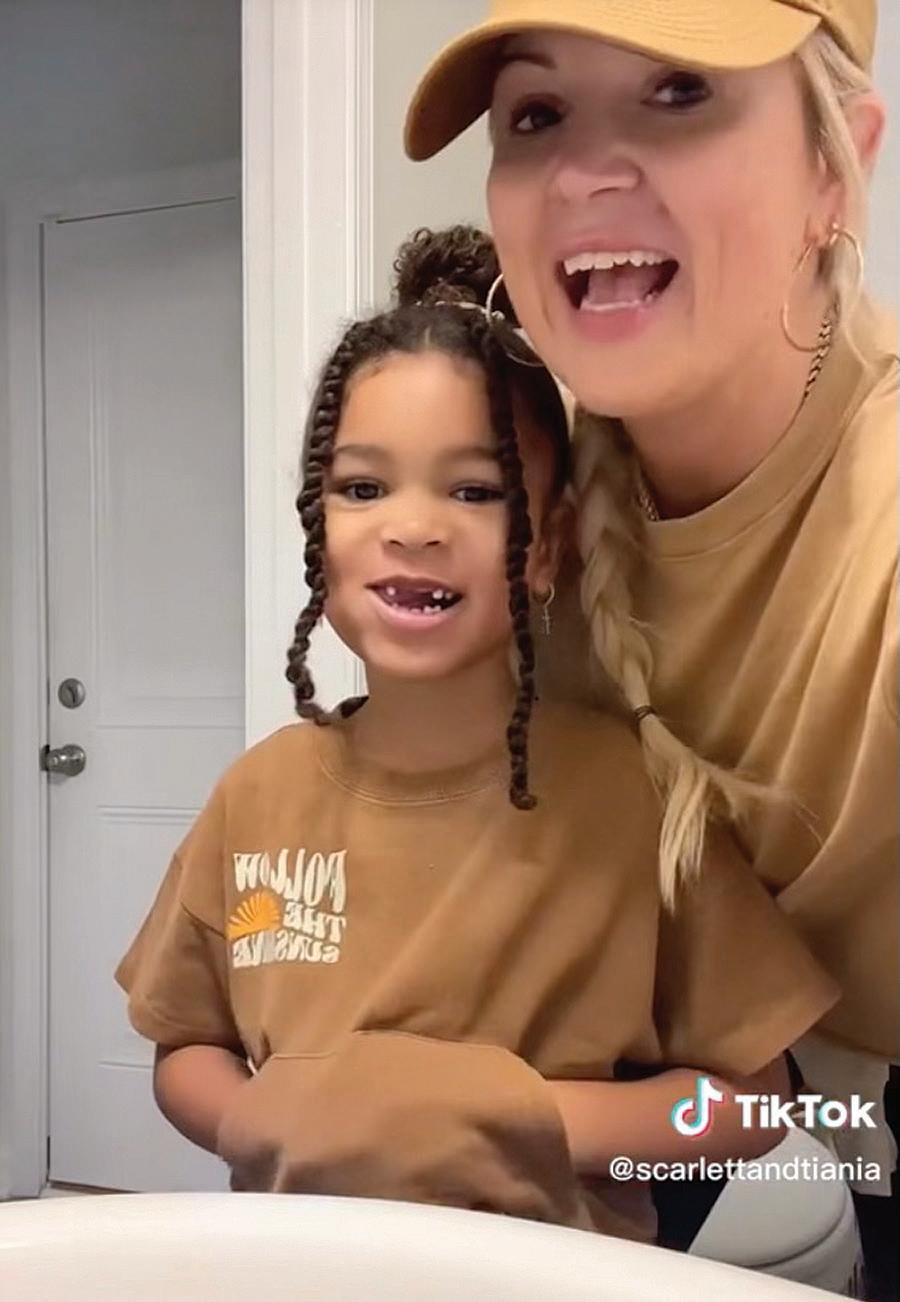
Tiania started doing affirmations with her daughter when Scarlett was only three. The young mother took a cue from her own father and sister when she was a child, remembering how encouraging they were if she ever got down on herself, and how much that meant to her. “I thought if I could get Scarlett to repeat affirmations after me, she would really believe them.”

Through the years, Tiania would take photos and videos of Scarlett during their morning routine, or while they were in the car, and Tiania would have Scarlett repeat words like, I love my brown skin. I am strong. I am beautiful. Jesus loves me

When the pandemic descended in 2020, Tiania observed that people were looking for anything that would make them feel better in the midst of an uncertain season—and many were turning to social media as a way to connect and find hope during the shutdown. Tiania began to think that maybe what she and Scarlett were doing might resonate with people who were looking for positivity during that dark time. Then it occurred to her: Okay, I can take these videos to social media, and maybe what we’re doing will help someone.
The reaction they received from their simple affirmations, often recorded while Tiania styled Scarlett’s hair or as they walked together, was overwhelming—and soon their videos had millions of views. Thousands have responded to the encouraging words and said that they’re beginning their own affirmations with their children.
“It makes me feel good when Mommy does my affirmations,” says six-year-old Scarlett, who also teamed up with her mom to create a positive picture book for kids called I’m Going to Have a Good Day







“My prayer right now is that we will reach more people,” says Tiania. “A lot of people have come to know Jesus through our social media. With kids dealing with everything from bullying to racism, I want them to be able to take these words and use them in the real world. It’s a huge boost to their confidence.”
I AM BEAUTIFUL I LOVE MY BROWN SKIN
I AM STRONG














Adapted for print from the Jesus Calling Podcast. Put your phone into Camera mode and hover over this code to hear more of Tiania and Scarlett’s story!








































You can find Tiania and Scarlett’s book, I’m Going to Have a Good Day, at your favorite book retailer today!

19 IMAGES COURTESY OF TIANIA HANELINE; ISTOCK
An Egg-cellent Summer Breakfast

Lisa Steele knows a thing or two about eggs. A fifth-generation chicken keeper and founder of the popular blog Fresh Eggs Daily, she spends her days on a small farm in rural Maine, raising a brood of hens and cooking up their eggs for her farmhouse table. Lisa recently published her go-to recipes in her latest book, The Fresh Eggs Daily Cookbook: Over 100 Fabulous Recipes to Use Eggs in Unexpected Ways. She shared one of her favorite (and easiest!) breakfast recipes with us. We hope you enjoy it as much as we have!
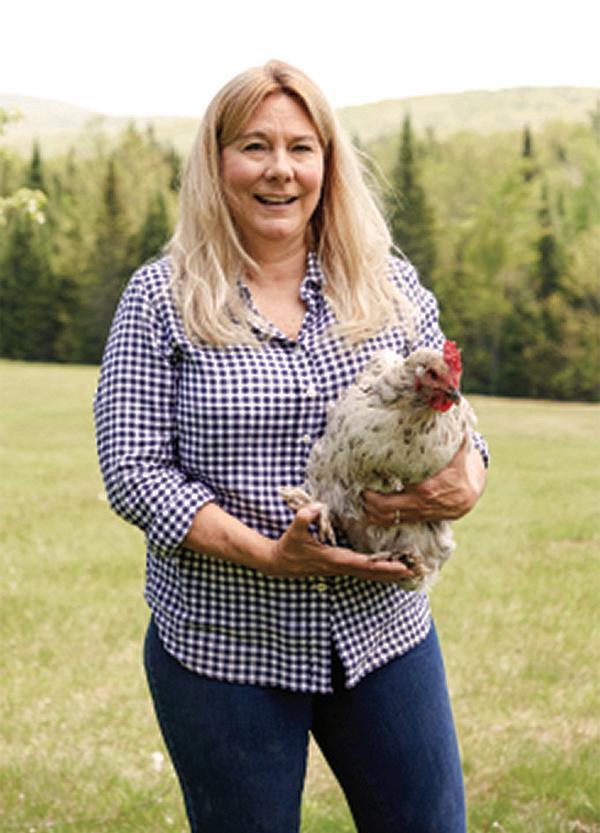
– The Jesus Calling Magazine team

















Double Dill Scrambled Eggs

(makes 2 servings)
I love fresh dill and grow it in my herb garden each year. Dill pairs especially well with eggs, and this cheesy scrambled egg recipe also calls for Havarti cheese with dill. My mom and I often enjoy Double Dill Scrambled Eggs for breakfast when I visit her. Not partial to dill? You can use regular Havarti and substitute a different herb.
INGREDIENTS
Extra-virgin olive oil or butter



4 eggs
1 oz. Havarti cheese with dill, cut into ½-inch cubes
Salt

Black pepper









Fresh dill, for garnish
Cook’s Tip:
DIRECTIONS




1. Drizzle olive oil or add a pat of butter in a frying pan, and heat on medium-low. As the pan warms up, whisk the eggs.



2. When the oil is shimmering (or the butter is melted), pour the eggs into the pan, and move them around with a spatula. Add the cheese, and continue to move the eggs around.
3. Cook until the cheese melts and the eggs are soft set and no longer shiny, about 2 – 3 minutes. Season with salt and paper, and garnish generously with fresh dill.
SHRED YOUR OWN CHEESE!
I always purchase cheese by the block, and shred it as I need. Commercially shredded cheese is treated with an anti-clumping agent that can mess up your recipes. Freshly grated cheese will taste, well, fresh!
Get your copy of Lisa’s book, The Fresh Eggs Daily Cookbook, at your favorite retailer today!

21
IMAGES COURTESY OF TINA RUPP; ISTOCK
WIN OR LOSE, IT’S ALL ABOUT CONNECTION
US National Soccer Player




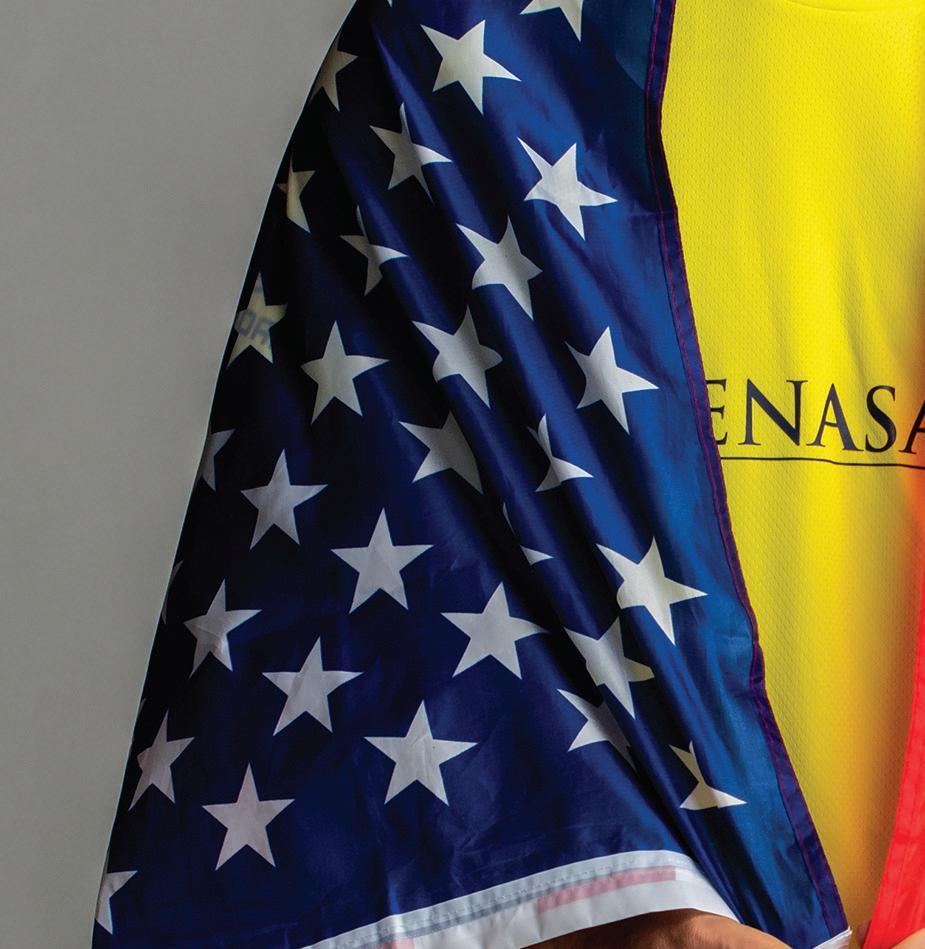

Walker Zimmerman’s True-Life Team Spirit
By Michael Overholt
SUCCESS OFTEN SEPARATES people— especially sports figures. Stars are put on pedestals, marked off as exceptional. After a big win, it’s routine to see the media pull a star away from teammates for a post-game interview or two.
That’s something soccer star Walker Zimmerman is very aware of and attempts to circumnavigate.




Throughout his whole life, he’s wanted to be relatable. “One of my biggest passions,” says the 29-year-old center-back for the Nashville Soccer Club, “has always been to make other people feel welcome. I try to bring in different groups of people who might not normally hang out together and put them together for the same purpose or cause.”
He describes this effort as it appeared during high school. His parents regularly opened their home to Zimmerman’s friends. He remembers looking around the room and noticing the diversity of people there, from high school jocks to marching band members, the bookish to the gamers, all milling about his parents’ basement playing games together.
Connecting others is an interesting passion, given Zimmerman’s hyper-competitive nature. He grew up the youngest of three boys in a neighborhood that prized athletic skill, where the kids would play any sport until dark, including
22
roller hockey. Winning was everything. In the Zimmerman household there was a thing called the “Zimmerman abort,” where one befuddled brother switched off the Nintendo out of sheer frustration because one of his brothers was winning so ostensibly.
Fast forward to today, where Zimmerman’s competitive nature is rolling at full speed: he’s been playing soccer professionally for ten years and earned a place on the US men’s national team (If you watched the men’s 2022 World Cup, then you definitely saw Zimmerman). You’d think that such a competitive nature would have severed connections with high school friends long ago. But Zimmerman’s friend Will Boni would tell you that’s not true.
is, and it’s just a peaceful way to connect with the Lord early in the morning or late at night. You’re going in there with a relationship with Jesus, and it’s all going to be okay. I think it does a really good job of setting that tone for people.”
It’s within that context of relationships that competition, as Zimmerman lives it, needs to be understood.
So, while it’s true that competition can separate people, it doesn’t necessarily have to. It can be easily reconciled within one’s faith journey as a way to keep people in close proximity to each other, striving together, and playing together.
In high school, the upperclassman Zimmerman would stop by to pick up the freshman Boni for a milkshake. And now, as a professional and international soccer star, Zimmerman still strives to connect with Boni. It’s something that surprises Boni, but that’s just who Zimmerman is.
“It doesn't matter what we do,” the soccer star says. “Who we are as people matters most at the end of the day. I’m such a normal person, you know. Come over. I’ll cook for you. We’ll play some cornhole.”

Zimmerman’s focus on including others stems from what he sees Jesus doing. He has studied how Jesus accompanies people so that—as the player says it—people can go ”through the whole day of knowing that you’re not going through this day alone.” And there’s a tool Zimmerman uses to help him make that connection to God.
“Jesus Calling provides you just such a peaceful truth about who God
Within the context of Zimmerman’s faith, competition is a way to connect with people, whether that be with his brothers playing video games in the basement, opponents on the soccer field, his wife in a game of Sequence, or a high school friend playing cornhole on a beautiful summer afternoon.
Because in the end, whatever they’re doing, they’re doing it together.
To keep up with Walker, follow him on social media.

23 IMAGES COURTESY OF NASHVILLE SOCCER CLUB AND ISI PHOTOS
for print from the Jesus Calling Podcast. Put your phone in Camera mode and hover over this code to hear more of Walker’s story!
Adapted
“
One of my biggest passions has always been to make other people feel welcome.
“
It doesn’t matter what we do. Who we are as people matters most at the end of the day.


A v a i l a b l e W h e r e B o o k s a r e S o l d
REFRAMING LIFE from “BUSY” to “FULL”









4 Steps to Manage Your Time Toward Loving Your Life
by Cynthia M. Stuckey
LONG-TIME BLOGGER CRYSTAL PAINE has authored multiple books, hosts a thriving podcast, and mothers six children between the ages of seven months and eighteen years old. From the outside looking in, the word busy seems to accurately describe her schedule. But she thinks another word is a better fit.


“I try to replace busy with the word full,” she says, “because when you say, ‘I’m so busy,’ it indicates you’re a victim of your calendar and circumstances. I feel like we have a choice. We can choose to spend our time intentionally.”
That kind of perspective-shifting has completely changed Crystal’s life, and she’s on a mission to spread that kind of intentional living to others. “My passion is to help women love their life by helping them create systems for things they need to do, so they have time and energy for the things that really matter. It’s possible to juggle a lot—but also enjoy your life and accomplish what matters most.”
It’s from this outlook of abundance that Crystal wrote her latest book, The Time-Saving Mom, where she shares her simple, four-step system to help women figure out what matters to them—and how to accomplish it without burning themselves out.
25
CRYSTAL’S FOUR-STEP SYSTEM TO MANAGE YOUR TIME AND YOUR LIFE


STEP 1: PRAY
“First off, for me, a successful day begins in prayer,” Crystal says. She typically starts each morning on her treadmill, praying for the day ahead, followed by some time in scripture and devotionals. “I love the Jesus Calling devotional, and I have used it for years. It’s a simple thing that really focuses my heart upward, that just reminds me of the truth. And it starts my day remembering what really matters.”
STEP 2: PRIORITIZE
“Ask yourself: what are your long-term goals? What’s going to matter twenty-five years from now?” Crystal says. Then, try to map out how to accomplish those goals, baby step by baby step, with what Crystal calls the 6x2 Priority System.
In this step, Crystal takes stock of her six main priorities to accomplish that week, and chooses two as main focal points of the day. The next day, she chooses two more priorities. And by the end of the week, she’s cycled through all six priorities.
STEP 3: PLAN

“If I could give only one strategy that allows me to stay focused and get more done without feeling frazzled, this is it,” Crystal declares. “It has changed my life—and I don’t say that lightly.” This step is surprisingly simple but effective. Crystal writes a to-do list, then simply blocks time on her calendar to accomplish that task.
STEP 4: PREP
In this step, Crystal has found that establishing morning and evening routines empowers you to accomplish your priorities. That includes getting enough sleep at night, and starting your day in a way that fills your soul.

“Once you’ve laid a foundation and created a solid, realistic plan, it’s time to set yourself up for success by creating great routines,” says Crystal. “Stop procrastinating, and start simplifying your life.”
THE LITTLE CHOICES WE MAKE EACH DAY CAN CHANGE THE TRAJECTORY OF OUR LIVES.
Crystal believes that we can often get in our own way when attempting to take control of our schedules—but we don’t have to. “I can be the problem, but I can also be the solution. We get to choose how we spend our time. It’s not about hustling harder or being a productivity queen. It’s about wrapping your time and energy and life around those things—that really make a difference.”
Interested in more time-saving tips? Get your copy of The Time-Saving Mom today!
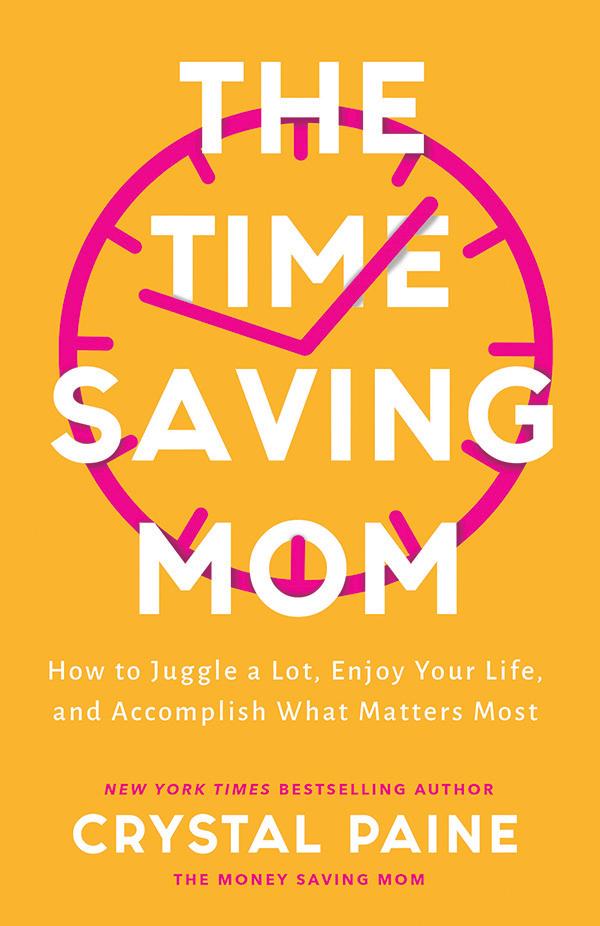
26 IMAGES COURTESY OF CRYSTAL PAINE; ISTOCK
Adapted for print from the Jesus Calling Podcast. Put your phone in Camera mode and hover over this code to hear more of Crystal’s story!
Try Your Hand at Journaling!
Take a few minutes to write about what you might gain from better time management. Here are a few prompts to get you started:








1. Think about what you hope to accomplish in your life and who you hope to serve. What are the main priorities that need weekly care and cultivation? List them here.
you consider your current load, which areas of your life seem to suffer when you get overwhelmed and over-burdened? How do you see this reflected in your physical and mental strength?
ou let go of hustling harder, where do you see potential for greater joy in your life?
greater



PEACE FOR A H AND HOPE FO

Jesus Calling Celebrates the International Warriors Who Spread Peace Across the Globe
At times, the world seems large and more fractured than ever before. Though that may be the popular perception, we are more alike than we seem. Humans all feel the sting of pain, but we can also experience hope for a brighter tomorrow.
Since its publication in 2004, Jesus Calling has been translated into 24 languages and has inspired more than forty million lives around the world. Who makes this possible? Publishing partners from all around the world, who bring the message of Sarah Young’s books to readers of all ages in languages and packages that touch their hearts, no matter where they call home.

PUBLISHING PARTNER: Gerth Medien























LOCATION: Wetzlar, Germany
German publisher Gerth Medien was founded in 1949, originally to produce and distribute vinyl gospel records. Since it began to publish books in the late 1960s, the company has blossomed into the one of the largest publishers of its kind, serving readers in Germany, Austria, and Switzerland.
“It is important to encourage believers in their daily lives,” says Johannes Leuchtmann, head of the editorial department. “Our readers not only long for spiritual challenge, but even more for encouragement and comfort. The devotional books by Sarah Young are a perfect combination of a deeper walk with God, finding your calling in life, reaching out to others in need, and providing encouragement for your everyday challenges.”
URTING WORLD R TOMORROW




PUBLISHING PARTNER: Svichado Publishing House































LOCATION: Lviv, Ukraine

In 1987, Ukrainian students at Poland’s Catholic University of Lublin wanted to do something useful for the church and their people, to help them develop spiritual values in the modern world. Their answer was founding Svichado Publishing House (svichado translates to “candlestick and mirror”).
The messages of Jesus Calling books have meant a great deal to Ukrainian readers. Bogdan Trojanowski, director of the publishing house, remarks that, “For many people, God is often abstract and distant. [Sarah Young] offers a different image of God—Father, Friend, Brother. The One who is present in all aspects of our lives.”

PUBLISHING PARTNER: Word of Life Press

LOCATION: Seoul, South Korea
In the 1950s, the Korean War upended millions of lives across the peninsula. As South Korea began to rebuild, global ministry TEAM Christian Missions sent missionaries who distributed literature that brought light and love to the devastated population—ultimately laying the foundation for Word of Life Press. Over the past seventy years, Word of Life has published more than four thousand books and Bibles, while running Christian bookstores in six locations across Seoul.
For years, Jesus Calling has been a favorite book among readers in Korea, with glowing reviews from both Christian and non-Christian readers. Through it all, Word of Life remains dedicated to their mission of inspiration. Minju Kim, Word of Life’s foreign rights manager, says, “We pray the books we publish shine with the truth and . . . bring comfort, healing, and spiritual nourishment.”
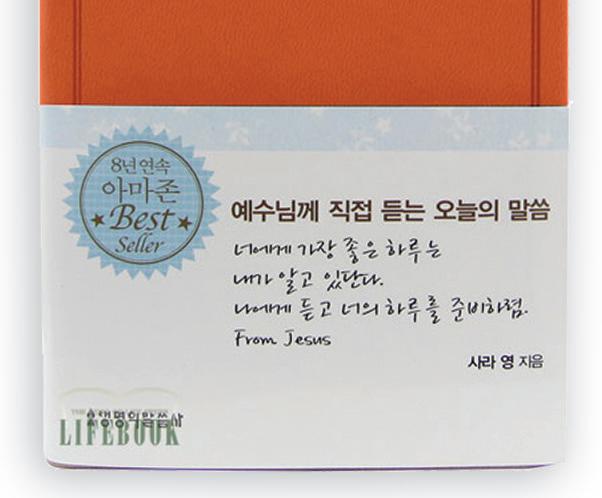


IMAGES COURTESY OF ISTOCK
THE PARENTING PUZZLE


Andy & Sandra Stanley on How to Get It Right
No matter if they’ve been parenting for three days or three decades, every parent asks themselves the same question: Am I doing this right?
Andy and Sandra Stanley sympathize. As co-founders of North Point Ministries and the parents of three adult children, the couple has spent decades mentoring other parents out of an overflow of experience and hard-earned wisdom. We sat down with them to discuss how to parent kids in every stage of development, which they outline in their brand-new book, Parenting: Getting it Right.
JC Magazine: At this point, you both have decades of parenting wisdom. How do you define the phrase “getting it right”?
Sandra: We’re in a fun place right now with our three adult children. Our main parenting goal was to end up with kids who want to be with us and with each other when they no longer had to be. When we think about success in parenthood, getting to this season of life with kids and having the joy of watching them choose each other and choose us is amazing! There’s nothing like that.
JC Magazine: That’s wonderful! Andy, you’ve mentioned that parenting operates according to “the Law of the Harvest,” and not “the Law of the Final Exam.” Can you explain that to us?
Andy: Well, the Law of the Final Exam says that “I can procrastinate forever and then cram for an exam and maybe still make a good grade.” But the Law of the Harvest dictates what happens in a child. The Law of the Harvest says that you have to sow at the proper time, you wait, and then you reap. The four stages of parenting we often discuss are those of sowing into the heart of a child so that ultimately you reap.
30
JC Magazine: Interesting. Can you tell us about those four stages of parenting?
Sandra: Understanding the four stages of parenting is really the framework we believe in. We see our parenting as a journey alongside our child, as they gradually change and grow.
The first stage, years 0 to 5, is the discipline stage, where we disciplined our children according to obedience and consequences for their actions. The next stage, years 5 to 12, is the training stage. These were the years where we were “putting the why behind the what,” and explaining our reasoning a bit more while we’re training them. In years 12 to 18, we take more of a coaching role, standing on the sidelines a bit more—allowing them to make more independent decisions. And like a coach, there are times that we sort of yank them off the field to make some adjustments, but mostly we’re letting them experience the natural consequences of their actions. And then finally, years 18 and on, are where we are now. And just being friends with our kids at this season is fun.
One of the things I realized not too long ago is that if we didn’t know our kids and met them, we would want to be friends with them. And that seems like a huge win.
JC Magazine: Absolutely. Are there any pitfalls you’d want parents to avoid in walking through the four stages of parenting with their children?

Andy: Yes. I would ask them to really keep the stages in order and not become friends with their children too early. A healthy adult relationship with your children is a reward of following through these stages. So to try and force a friendship with your children too early never, ever works. We decided to try to stay in our parenting seat as long as we needed to go through those three stages.
JC Magazine: What words of encouragement would you give to parents walking those first three stages?


Sandra: Some of our favorite moments with our children came in regular times of prayer and family meals. In both, consistency was key. Our prayer time wasn’t always some big reverent thing—there were plenty of wrestling matches mixed in— but we did it. And with family meals, we made a point to not make them times of correction. Dinnertime wasn’t usually teaching time, but a time to learn about and listen to our children. Connection is what really makes the difference.
Adapted for print from the Jesus Calling Podcast. Put your phone in Camera mode and hover over this code to hear more of Andy and Sandra’s story!



You can find Andy and Sandra’s book Parenting: Getting It Right at your favorite book retailer today!
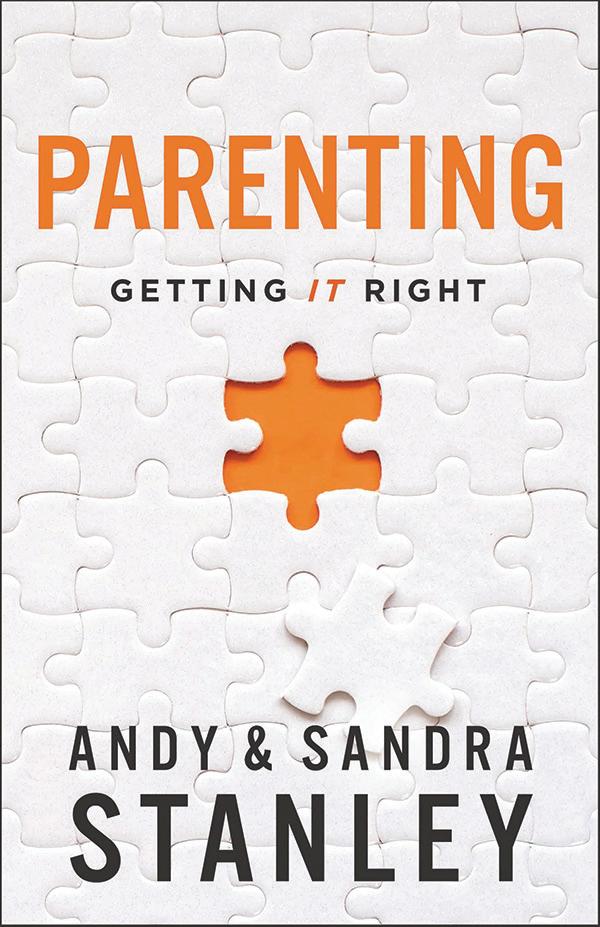
31
IMAGES COURTESY OF ANDY &
SANDRA STANLEY; ISTOCK; ENVATO
Stand for What You Believe
Country Music’s Aaron Tippin Salutes the Troops

 by Autumn Mularski and Amy Kerr
by Autumn Mularski and Amy Kerr
AS A COUNTRY BOY growing up in upstate South Carolina, Aaron Tippin learned a few things that he’d take with him throughout his life: he loved to fly, he loved to sing, and he loved his country.
Flying was Aaron’s first love. His dad was a commercial pilot who pulled four-year-old Aaron up on his lap in the cockpit. “And when I looked out the window and saw that the cars on the ground looked like Hot Wheels toys, I thought, This is it. There’s nothing greater,” he remembers.
When Aaron wasn’t tagging along with his dad to the airport, he was working on the family farm, raising hogs for 4-H and cutting hay. As he was riding the tractor out in the hay field, nine-year-old Aaron found himself bored and began to sing. “I guess that’s why I sing and talk so loud,” he muses, “because if I was going to hear myself sing over the roar of that tractor engine, I had to sing pretty loud!”


Though he developed powerful pipes while he did his chores, Aaron never considered music would be his career—his heart, after all, belonged to flying.



By the late seventies, Aaron was a corporate pilot, trying hard to make it to a major airline “like Delta or Piedmont,” he says. But when the energy crisis hit, Aaron watched the major airlines begin to furlough





their pilots, and he developed another career path. “I told my buddies, ‘Let’s go start playing honkytonk clubs!”
By day, Aaron drove bulldozers and semitrucks to pay the bills, and at night, he’d perform country music with his friends, inspired by his heroes George Jones, Conway Twitty, and Loretta Lynn. Eventually he moved to Nashville to see if he had the chops to chart a path as an artist.
But making it on Music Row was harder than Aaron anticipated. “I found a job working in an aluminum rolling mill overnight, and in the daytime, I’d go write songs. I knew nobody, and boy, that’s when I started getting close to Christ. But I started getting songs put on hold, and because I was so poor, I sang my own demos. One day a producer sent one of my songs to see if Clint Black would be interested in recording it.”
He was—and the rest is history. Aaron nabbed his own record contract with RCA in 1990, and for the next decade, he racked up hit after hit.
From his very first single, “You’ve Got to Stand for Something,” Aaron showcased his signature twang along with the values close to his heart. The song, with lyrics that tell the listener to stand up for



what they believe in or they’ll “fall for anything,” was meaningful not only to Aaron, but to all kinds of audiences. “That song got me on The Bob Hope Show, but it also became an anthem for our troops. It played on country radio during Desert Shield. And since then, I’ve been lucky enough to write inspiring songs, like ‘Where the Stars and Stripes and the Eagle Fly,’ for one. It’s important to me. “
“The first time I got to play “Stars and Stripes” for the troops was in Afghanistan. I’m looking out across the desert, I can see smoke from destroyed buildings. And when I start playing that song, these guys and gals start singing it. That’s a big deal: US troops just standing up to say, ‘We’re proud to be warriors.’”
It’s something that’s stuck with Aaron for years. As for what’s next, he’s not sure, but he does know one thing: “I believe that He does have a plan. God’s not through me yet.”







Catch up on Aaron’s latest projects and appearances at aarontippin.com.
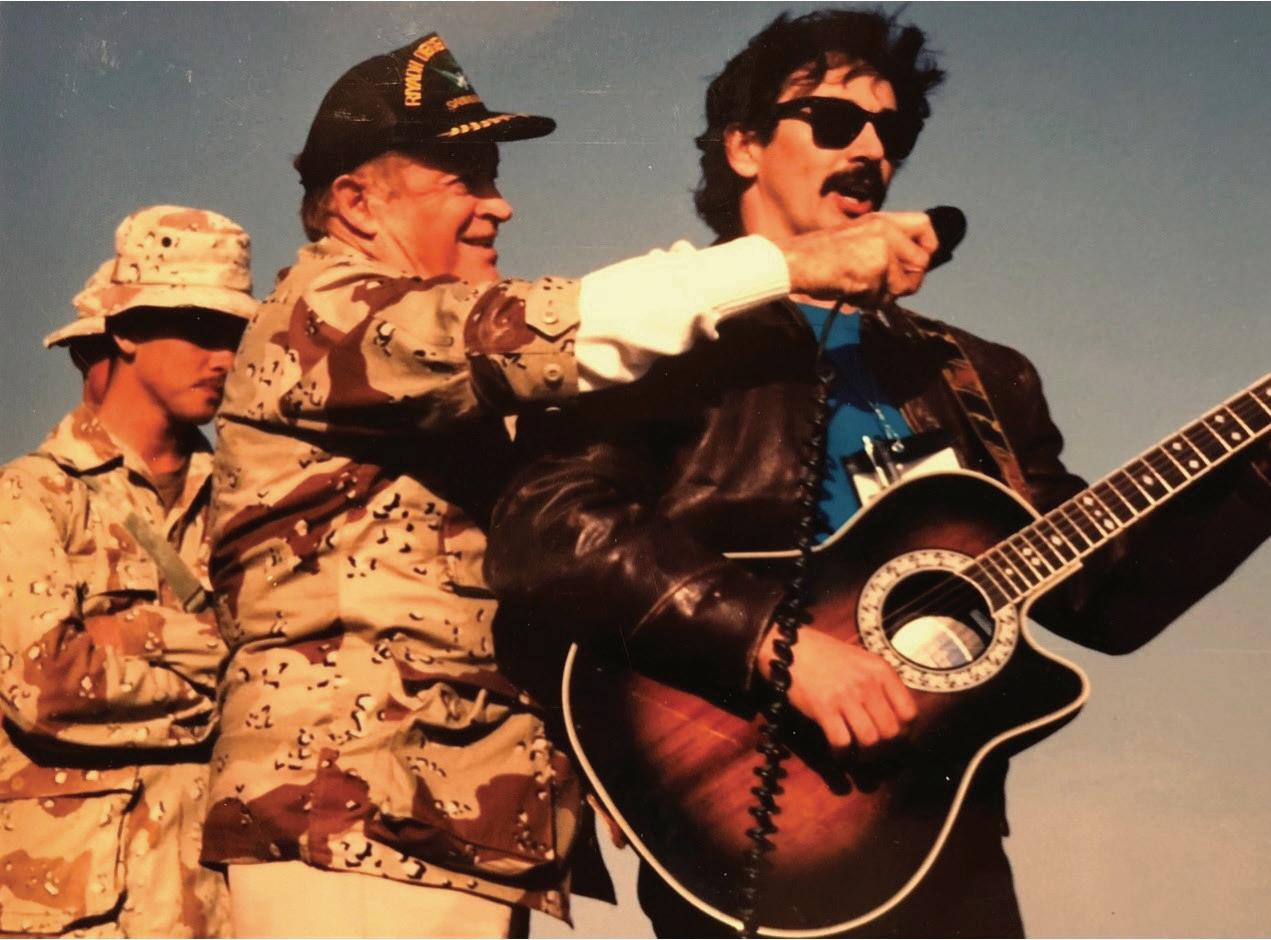

















IMAGES COURTESY OF AARON AND THEA TIPPIN; ISTOCK
Adapted for print from the Jesus Calling Podcast. Put your phone in Camera mode and hover over this code to hear more of Aaron’s story!
FROM TOP: Aaron with Bob Hope in Afghanistan, Aaron performing at Ryman Auditorium, Aaron in flight gear
That’s a big deal: US troops just standing up to say, ‘We’re proud to be warriors.’
helping them to put on their own productions, eventually working with the organization for eight years.


Finding the Light Again
IF YOU’RE LIKE ME , then you remember watching the Ewing family dreaming and scheming every Friday night on the TV show Dallas. After the show went off the air, I’d wonder sometimes, What happened to those folks? Well, I got the answer a few weeks ago when I talked to Charlene Tilton, who played the sassy niece “Lucy.” And man, does she have a story for us—I’m going to take it back to the beginning.
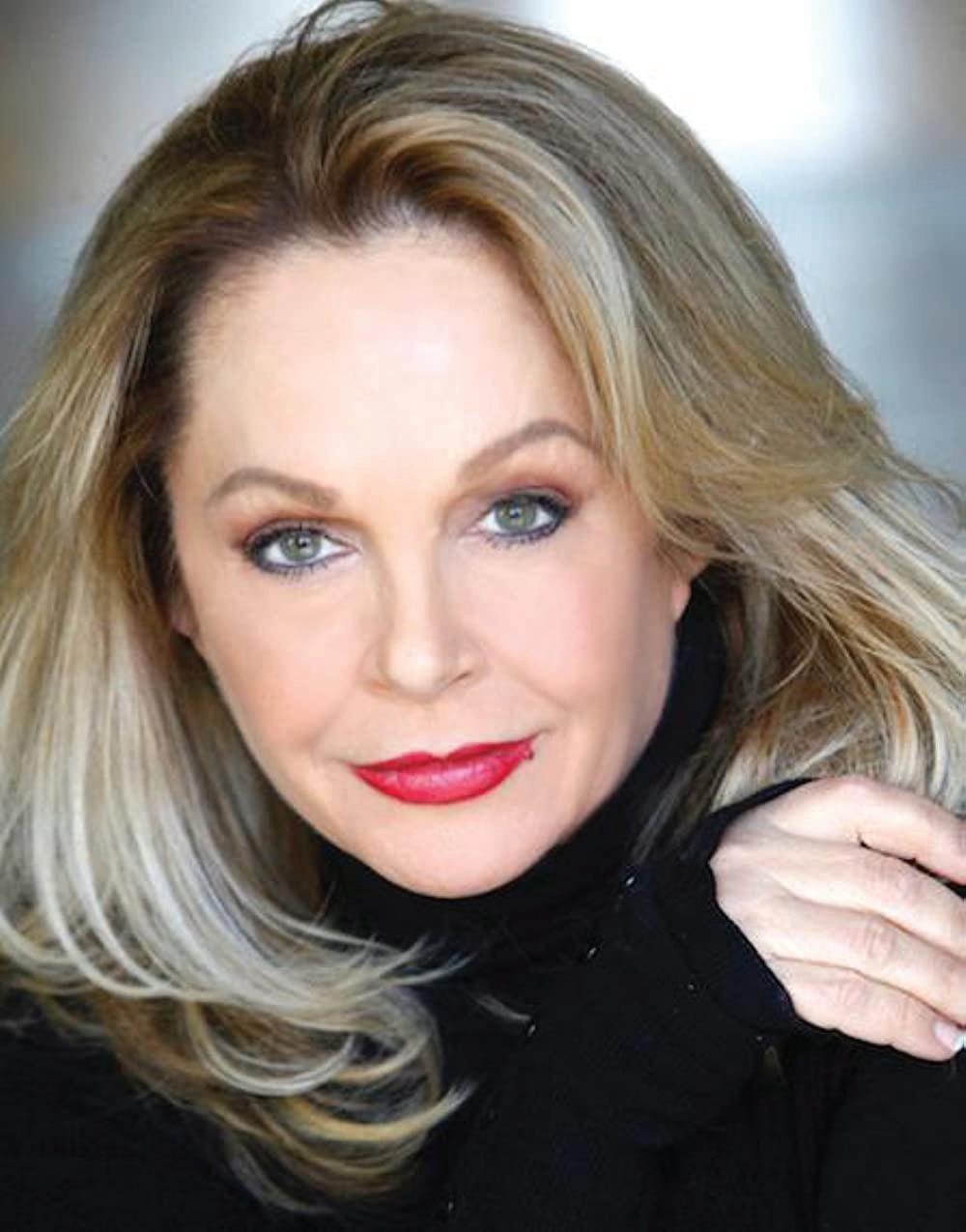

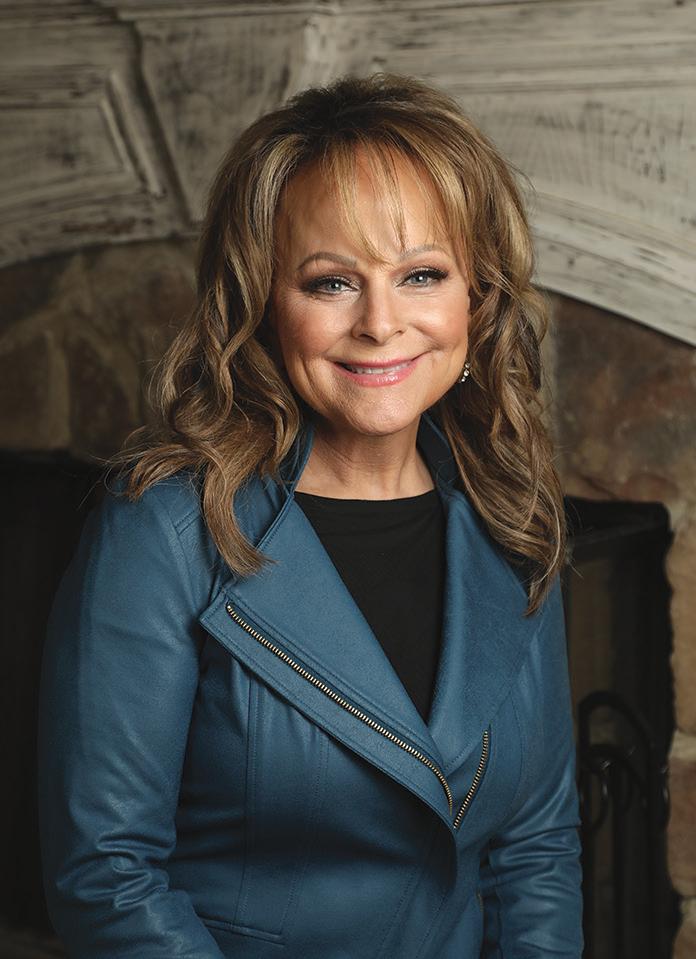
In the 1960s, Charlene grew up in Los Angeles as the daughter of a single mother. From her early years, Charlene remembers going to the movies and being enthralled with Julie Andrews in Mary Poppins and The Sound of Music. She wondered what it must’ve been like to have a momma who cleaned and sang and loved on the kids in her care. Unfortunately, Charlene’s momma suffered from severe mental health issues—so severe that she was placed into institutionalized care multiple times in Charlene’s childhood.
So Charlene always felt like she was on her own. By the time she was fifteen, she was living alone in a Hollywood apartment, nabbing small roles on Happy Days and films like Freaky Friday. But her big break came at age seventeen, when she landed the role of “Lucy” on Dallas. “God really had His hand on my life,” she says. “I was surrounded by people who had the best work ethic. They protected me. We became a family.”
In adulthood, Charlene’s life felt far more stable than it used to. She had a daughter, Cherish Lee, and decades later, she found the true love of her life: cinematographer Cheddy Hart. But in 2009, tragedy struck as Cheddy suddenly died from heart failure at age fifty-four. Feeling abandoned once again, Charlene sank into a dark depression.
Eventually, though, she found the light again. “When you’re grieving or feeling sorry for yourself, the best thing is to go help somebody else,” she says. She was inspired by a friend who worked with Actors for Autism and decided to join the cause. She loved coaching the children,

Today, at age sixty-four, Charlene’s in a much brighter place. She loves spending time with her two grandsons and acting in inspirational projects. Her latest film Heaven Sent, about two folks wondering if it’s possible to find love later in life, is streaming on Pureflix. “It’s the best movie I’ve ever done,” declares Charlene, “so funny and adorable.”
Sometimes we think we’ve run out of second chances. But I look at Charlene’s story, and I’m reminded of this truth: God puts people in our path to help us out of the dark times, so we can see the light again. _ Susie
34 IMAGE OF SUSIE MCENTIRE-EATON COURTESY OF SCOTT EVANS
“
God really has His hand on my life.
JESUS LISTENS: STORIES OF PRAYER YOUTUBE SERIES
Susie McEntire -Eaton HOST OF THE JESUS LISTENS: STORIES OF PRAYER YOUTUBE SERIES
Charlene Tilton
ANYBODY’S MUSIC
Maverick City Music’s Naomi Raine: Taking Worship Off The Stage and to the People
 by Lauren Winfield
by Lauren Winfield
Naomi Raine is a gospel singer and worship leader who, despite her five GRAMMY wins in the past two years, remains grounded in her calling as a worship leader.


In fact, leading worship is a path she’s been close to her entire life. Her parents, Lawrence and Marissa, were worship leaders themselves and brought along Naomi on their travels. Some of Naomi’s earliest memories found her playing under pews while she learned the songs her parents played in their worship ministry. Conscious of their daughter’s burgeoning musical talent, Lawrence and Marissa bought Naomi a piano at the age of ten (“I’m not good at piano—I’m actually pretty bad!” the singer says with a laugh). Though the instrument wasn’t exactly part of her calling, it became her gateway into songwriting.
see it, it looks like everybody. It’s not just one type of person—it looks like heaven.”
And the music definitely resonated. Scroll through Maverick’s YouTube videos, and you’ll find a staggering amount of views. One of their most popular worship songs, “Jireh,” has racked up over 143 million views. And in 2023, Maverick City Music tied global superstar Beyoncé in GRAMMY wins: each artist won four at the ceremony earlier this year.
“I believe worship is an invitation to experience the presence of God. It's where we can be transformed and renewed,” Naomi affirms. “I think sometimes worship is that catharsis, a releasing of that tension and emotion and the things that we bottle up so often. We can allow music to say things that sometimes we can‘t put words to.”
Naomi carried her parents’ musical torch into her own adulthood. Today she’s a member of Maverick City Music, a collective of artists from different walks of life who are united, as Naomi says, in one specific interest: laying their lives down for Jesus. “I think people have resonated with Maverick because we just come together and bring authentic, organic music,” she explains. “We get together, sing songs, and put it up on YouTube. You can hear our clothing rustling, you can hear us talking and laughing. And when you
Adapted for print from the Jesus Listens: Stories of Prayer YouTube series. Put your phone in Camera mode and hover over this code to see Naomi tell her story!

35
“
We can allow music to say things that sometimes we canʼt put words to.
IMAGES COURTESY OF NAOMI RAINE
MUSIC SPOTLIGHT
Find Naomi’s new album Journey wherever you stream or buy music.
GOD CAN HANDLE YOUR EMOTIONS. HE CREATED THEM!



 by Abigail Nibblett
by Abigail Nibblett






36
SAD. MAD. SCARED. HAPPY. These normal human emotions are a part of daily life. But what do we do when they sometimes get the best of us?
Professional counselor Michelle Nietert and Lynn Cowell of Proverbs 31 Ministries set out to create a guide that practically equips children—and their grown-ups—with the tools they need to wade through their emotions. The result of their work is a brand-new book called Managing Your Emojis: 100 Devotions for Navigating Your Feelings.
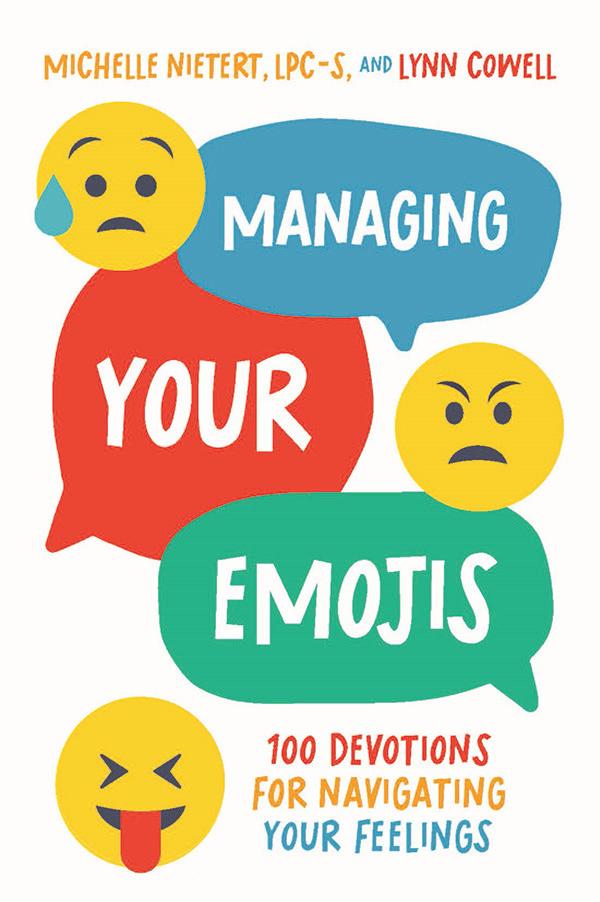
“So often children don’t have emotional vocabulary to describe how they’re feeling,” Lynn explains. “And while we cover these four basic emotions, there’s such a spectrum of emotions that children face. We want them to learn they can turn to God to share their emotions with Him.”
The first step to managing our emotions, the pair advise, is to acknowledge them. Taking a moment to pause and think about what it is we’re experiencing— and noting when something isn’t quite right—is key to understanding the root cause of an emotion. The space we create with that pause also gives us a chance to turn things around.
Having that kind of self-awareness— understanding the need for a positive way to channel our big feelings—is much easier for adults than for children. But Michelle encourages adults to coach kids to develop healthy coping skills on their own. “We have to teach our kids how to hold on to hope, how to become resilient, and how to persevere through difficult times. Because very often, if we’re not talking about these things, our kids are still experiencing them. And when I talk with kids across the country, do you know what their number-one fear is? They’re scared of disappointing their parents. So often, when they’re having internal struggles with their emotions, they’re hiding it from their parents. And I have a desire to see parents become an emotional compass.”
And it doesn’t have to just be a parent who offers that kind of “emotional compass” support, Michelle and Lynn explain. It could be another trusted adult, like a grandparent or a teacher, who can be a resource for the child and say, “I’m not just going to listen and try to fix you. I’m willing to come alongside you and sit there while you struggle and acknowledge how hard it is, but also provide hope.” That kind of support is invaluable to kids—and adults—struggling to process their emotions. Because no one wants to face these hard feelings alone.
Secondly, Michelle and Lynn direct readers to identify where they feel that particular emotion in their bodies. “Do we feel it as tightness in our head or in our chest? Kids tend to feel emotion in their tummies, and they’ll talk about having tummy aches. For some adults, they feel it as a heart racing really fast. So beginning to become aware of a physical symptom as something going on in your mind and heart is very important.”
Once we acknowledge and locate our feelings, the pair says, our next step is turning to God and letting go of that feeling, no matter what that looks like for you, “whether we breathe it out, jog it out, dance it out, or we talk it out,” says Michelle. “There’s great research about writing out our emotions. I love to write out prayers to God, and I know that Lynn uses journaling. I think all of that is involved in helping us to release our emotions.”
“I’ve said this to my kids since they were very little: ‘There’s nothing you’re going to face that you, me, and God can’t handle together.’ We can teach kids that we’re not fragile, because we serve a very big, powerful God who can help us during difficult times.”
Adapted for print from the Jesus Calling Podcast. Put your phone in Camera mode and hover over this code to hear more of Michelle and Lynn’s story!


37 IMAGES COURTESY OF ISTOCK
“
There’s nothing you’re going to face that you and God can’t handle together.
Michelle and Lynn’s book, Managing Your Emojis, is available at your favorite book retailer today.
Laughter:
G O D ’ S



S P I R I T U A L






M E D I C I N E

Comedian Nazareth Brings the “Ultimate Joy” to Those Who Need It Most
by Michael Overholt
NAZARETH IS A CHRISTIAN COMEDIAN from Nazareth, Israel (yes, that Nazareth), now living in southern California by way of Kuwait. With that pedigree, it makes a little more sense that the same person could appear on both Comedy Central and The 700 Club

Understandably, the path leading to both venues is … pretty winding.
When he was three years old, Nazareth’s family moved to Kuwait, where he spent a happy childhood. When he reached his late teens, Nazareth decided it was time to leave the nest so he could study electrical engineering in the US. He was accepted to at universities in New York and Los Angeles, but his parents had other ideas. Nazareth would be going to Ohio.
At first he thought his parents were the ones with the sense of humor, but they were dead serious. “‘Oh,
those are big cities,’” says Nazareth, recounting his parents’ reasoning. “‘You can be hooked on drugs and trouble and have a bad life. We’re going to send you to Toledo, Ohio.’”
The implications of this choice became vivid when his parents immigrated to the US, moved in with their struggling student/son/host, and learned the cold and gray of northern Ohio was too much change too soon. When Nazareth finished his schooling, the family flew the coop at first chance to southern California.
So, there’s the connection to the sunny west. What about comedy? After all, engineers aren’t exactly known for their comedic muscle.
On a whim of self-improvement, Nazareth signed for a marathon. Not a 5K, or a 10K—but 26.2 miles of pure torture. “I was smoking a pack of cigarettes a day, and it wasn’t healthy,” says Nazareth. “But I said, ‘You know what? I’ll do two miles this year, two miles next year, two miles after. Eventually, one day, I’ll finish it.’”





Success as a comedian came rather quickly for Nazareth, as he soon engaged with a manager and agent. He was the new face of The Improv, a renowned Hollywood comedy club, and slated to star in an NBC sitcom called Fish Out of Water. “Everything was going like I was the hot thing in Hollywood.”
But another reality set in: Hollywood culture. Shows were just the preamble to a night of drugs and alcohol. Maybe his parents had been right all along. But one day, a fellow comedian invited him to church (“I’m like, ‘I’m from the Holy Land, Of course I’ll go to church with you!’”). And that day, Nazareth put his faith in Christ, and decided to quit comedy coldturkey despite the protests of his management.
The night before the race, as Nazareth was carbing up at the civic center, he happened to meet legendary boxer Muhammad Ali (no, really—it wasn’t a dream in a carb-induced coma). And his childhood hero asked him point-blank, “You’re going to finish, right?”
How could he tell “The Louisville Lip” no?
Nazareth somehow managed to finish the marathon. As he stumbled across the finish line and sat down, whether by lack of oxygen or the endorphin buzz that only a marathon can stimulate, Nazareth asked himself a question that would change the course of his life: What do I want to do in life that, if I never get paid for it, I will still do it to the best of my ability?
The answer surfaced immediately: comedy.

Nazareth loved to make people laugh, so he signed up for an open mic night at a comedy club. If he could run a marathon, he figured, surely he could stand in front of folks and tell them jokes. And of the nine attendees at his first gig, two fell out of their chairs from laughing so hard.

He’d found his groove.

But he didn’t leave comedy for long. The pastor of Nazareth’s church saw an opportunity for the comedian to use this gift as a ministry, and from that point on, he’s been performing with a purpose. “I want to go where laughter is needed,” he says. “A lot of times, homeless people, people who are hurting, or women in a halfway home—for those people, life is so hard they don’t have time to go to a comedy club. I want someone in the audience who can’t afford to go to a comedy club to bring their family without having to pay for it. To see families together laughing and getting to hear the gospel—to me, that is the ultimate joy.”
See where Nazareth is performing in a city near you! Go to nazarethusa.com.

Christian Pickup Line Fails




said,


Adapted for print from the Jesus Calling Podcast. Put your phone in Camera mode and hover over this code to hear more of Nazareth’s story!




IMAGES COURTESY OF NAZARETH; ISTOCK
“
I want to go where laughter is needed.
I said, “You remind me of the verse, Love thy neighbor.”
She
“You remind me of the verse, Depart from Me, I never knew you.”
SUMMER IS BETTER WITH FRIENDS!
GRAB A LOVED ONE AND PLAY THESE GAMES TOGETHER.
Tell Your Own Beachy Story!
Choose one person to ask the group (each person gets a turn at a word) how they’d fill in the blanks to complete this story, and when you’re done, read it out loud!
THIS OR THAT?
Summer Edition
Get
BEACH or LAKE?
(adjective)
(noun) (noun)
(famous athlete) (celebrity)
(verb ending 'ing’)
(verb)
(adjective)
POPSICLES or ICE CREAM?
ROADTRIP or STAYCATION?
FLIP FLOPS or BAREFOOT?
BOOK or PODCAST?
HAMBURGERS or HOT DOGS?
KETCHUP or MUSTARD?
FIREWORKS or FIREFLIES?
HIKING or SWIMMING?
Birds of a Feather
Find the two birds that are the same!
(plural adjective)
(noun) (adjective)
(food) (food)
It was a _____________ summer day, and I decided to go to the beach. I packed my _____________ and _____________ and hit the road. I met up with my friends _____________ and _____________ who were _____________. I decided to _____________ because the ocean was _____________. The water was _____________ and there were lots of _____________ in the water. Next, we were feeling _____________ so we ate some _____________ and _____________. It was a _____________day.
(adjective)
40 GAMES j PUZZLES
to know your people! And if your answers don’t align, argue until
of
is declared
one
you
the winner. (Just kidding!)
IMAGES: ISTOCK, SHUTTERSTOCK




P.O. Box 141000 | Nashville, TN 37214 PRSRT STD U.S. POSTAGE PAID PERMIT NO. 404 PONTIAC, IL























































 by Lauren Winfield
by Lauren Winfield


























 by Laura Neutzling
by Laura Neutzling


























































 by Michael Overholt
by Michael Overholt















 by Abigail Nibblett
by Abigail Nibblett



















































































































































































































































































































































































































































 by Lauren Winfield
by Lauren Winfield






 by Abigail Nibblett
by Abigail Nibblett







































